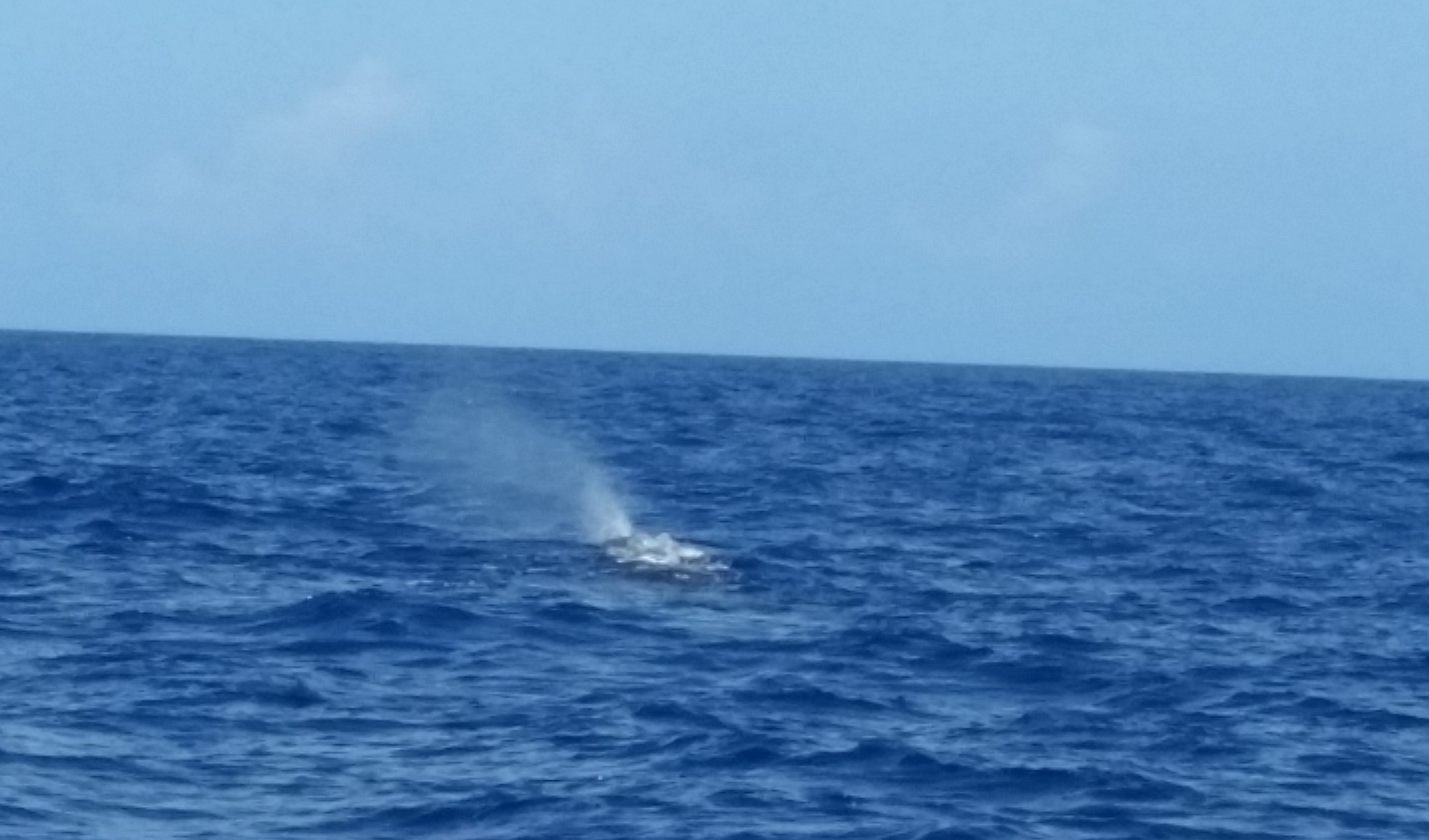Fair Winds, Capt. Mike
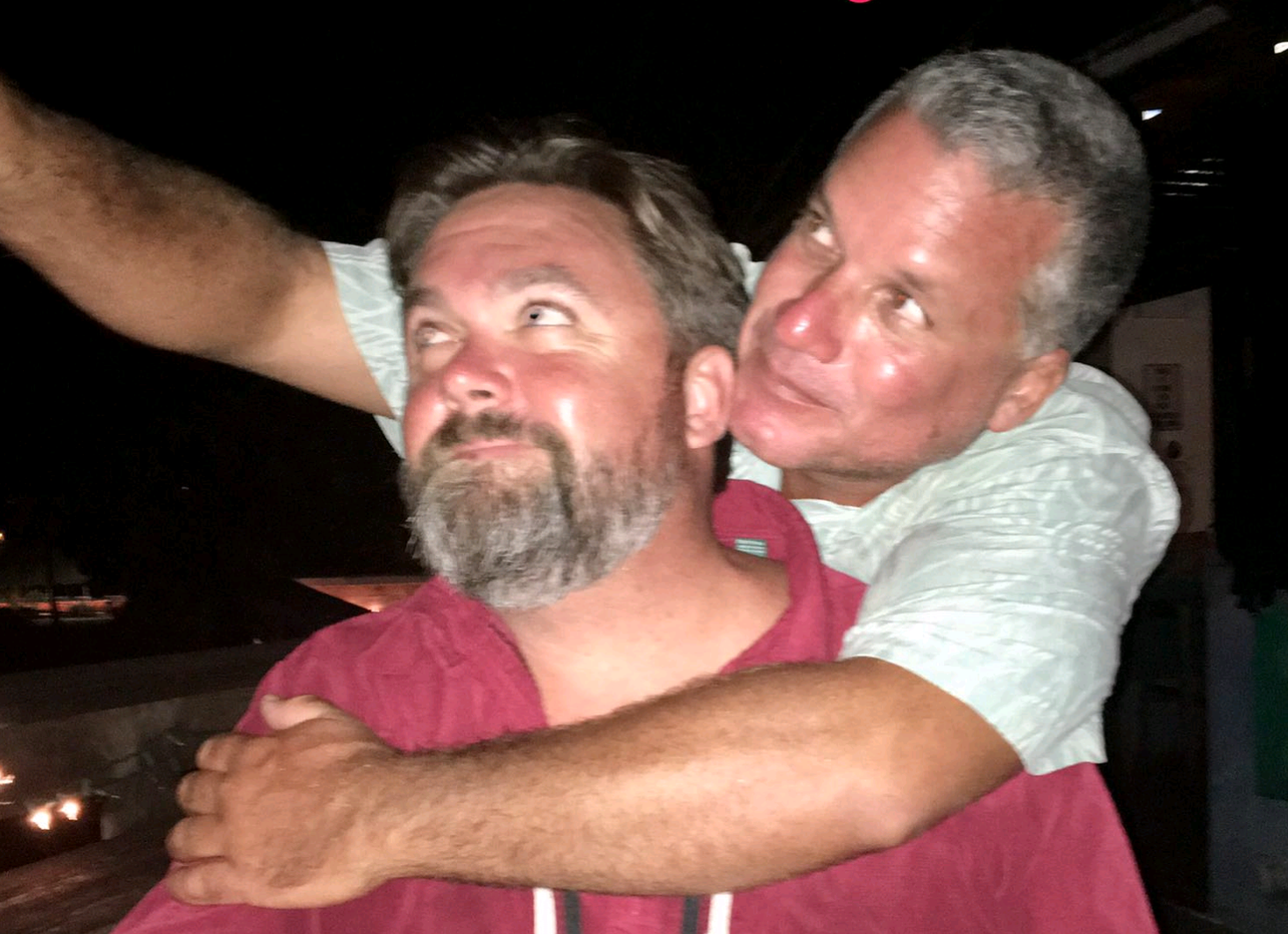
Much has passed without comment, as you can infer from the datestamps, or just from having lived through the last couple years yourself. It’s not an excuse, I own this blog, not vice versa. Sometimes what’s inside can’t get down onto black and white for me and it isn’t mere laziness.
I just didn’t want to turn this into an obituary column. Reality doesn’t often consult my wants, more a pity.
The call came to me as we were on big island, trying to figure out where to get Max his vaccines for school -remember when vaccines were an easygoing no-hurry part of our routine? July 29th, or 30th? 2019. Yeah it’s getting on two years. It’s definitely time to put ink on dead tree, or at least electrons on a drive somewhere.
The receipt of the news is still a grey fog shot with hard rain and hot vapor over Puerto Rico highway asphalt- really all I remember clearly until I boarded the flight out to St. Thomas. Sara just reminded me that acutally it was Freddy who called, and that she answered the phone, as I had all I could handle with downpour and traffic in San Juan, trying to bring little Max around to the idea that a quick shot in the arm was certainly worth the amazing payoff in ice cream to follow.
I remember I parked on the margin as quickly as I could as Freddy stumbled through the words, and I dumbly repeated them. Capt. Mike Nisius, was dead. Suddenly, without warning, a pulmonary embolism, aboard their cutter anchored off Charlotte Amalie in St. Thomas. Laura tried to resuscitate him, but he was gone at the age of forty-five, leaving her alone at anchor to cope with what remained, their cat, and dog aboard a boat undergoing engine repair at the early side of hurricane season. She had managed to wave down a passing vessel and they brought Mike ashore, and started to deal with the misery.
I simply switched to auto-pilot. Sara booked me airplane tickets – second time I’d flown in over a decade. Avalon was berthed in Sunbay Marina, snug as weather was beginning to spin up in the Caribbean. It was just a matter of flying out, helping Laura to pick up Mike’s ashes, and help her sail back to Puerto Rico. Freddy and Val, my island parents, were flying back out to St. Thomas after having just returned to Vieques from spending a week sailing around with them. They were helping her get things together and keep together, but they weren’t going to make the passage back to deliver Surely Sea home. I was lucky to have the stress of immediate necessary action to take, to help a dear friend, and to meet an obligation to someone close who passed.
If you know what it’s like to lose someone suddenly and then try to inadequately tie up the frayed line of the part you’re able to reach, then I won’t bore you. You already know.
If you don’t know what it’s like, I can’t really explain it beyond the desolation, hot rage, disorientation, and eventually just envy. Especially with Mike, because as much as it’s uncool to say, in this case, it probably should have been me; I came here to run out the clock as pleasantly and painlessly as possible. Mike had a lot of living he wanted to pursue down here. But humans, at least in this part of our evolution, don’t get to decide to continue living. The end will come for you when it comes. The conversations we put off, that which gets left unsaid just hangs there and follows behind those who remain.
I’ve lost a score of friends since moving to Vieques. It’s a steady drumbeat, a dark feature of living this way. Most of them I had met on-island. With Mike it was different. I knew him before, when I was doing time on the docks at Little Creek. People like Mike and me are not easy to get along with. Of course not – “easy” people can’t do what we do. This life will run them right over. Or perhaps we came here to do this and it just made us more of what we are – cynical, at times ruthless, eager to make sacrifices that would horrify the well-adjusted folk ashore. Maybe I’m just speaking for myself though. Although we shared the big-ticket philosophical and pragmatic points, Mike and I differed wildly in the optional packages, happiness and fulfillment being among them. Mike seemed to have built a better infrastructure there than what I struggle with. Although we often disagreed, I valued his thoughts, I miss arguing with him sometimes more than I miss agreeing with him.

Mike, Laura, and their dog Abby Jean, sailed down here on Float On from Virginia, with his dad aboard as crew. Mike had planned this since shortly after I came to Vieques. This was their jumping off. In the years they had in Vieques, they weathered a couple hurricanes, lost their boat, gained another one. They became invested in the community, worked, loved, and experienced this weird, poorly-defined lifestyle we all come to terms with here. They moved aboard Surely Sea and set off again into the blue.
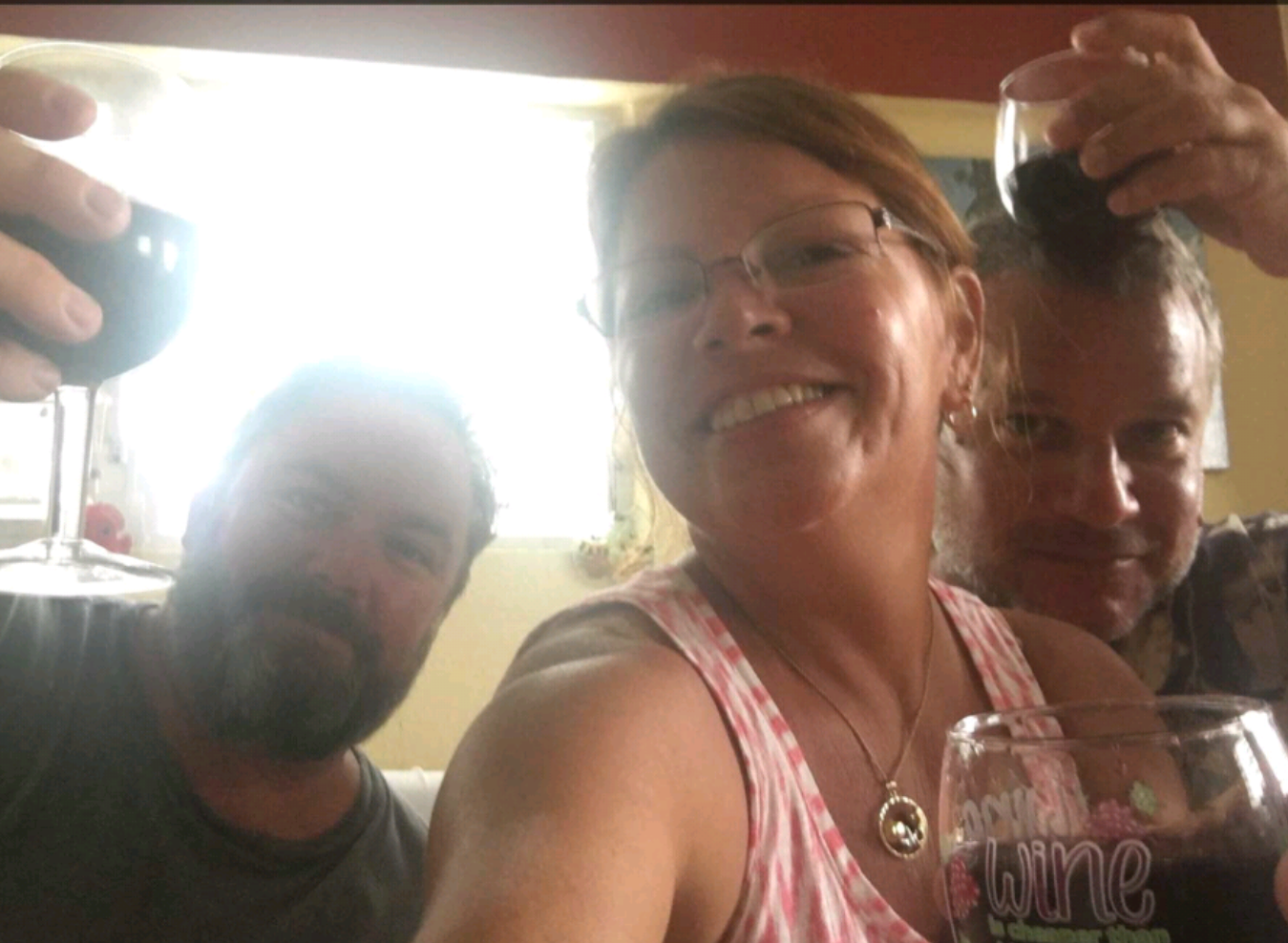
“Leave it to Mike to go out after a perfect week,” Laura recounted that in the past few weeks he had spent time with his parents and sibs, talked with his kids, went cruising with Freddy and Val, and was in the process of fueling up their dinghy to take Abby for a walk after breakfast when he checked out suddenly, silently.
Laura and I forced ourselves to eat, manage the engine repair, try desperately, unsuccessfully to remember passwords, contacts, and accounts that belonged to Mike which she now needed. Freddy and Val returned yet again to Vieques. We collected Mike’s ashes a few days later and carried them back along the waterfront of Charlotte Amalie under sunny skies that would soon turn to a storm. Laura and I sailed for Fajardo with gale bearing down, that would overtake us. I stupidly chose not to stay put in the anchorage back in Yacht Haven, and I’m usually the most vocal advocate of remaining in a safe place on a bad day. The doppler radar told the whole story before we even weighed anchor. But my mind was closed around the bright proposition of getting the hell out of St. Thomas and back to Puerto Rico waters. The irrational imperative to be back with Sara and Max, to secure Avalon, to grieve at my own leisure overwhelmed my sensibility.
All hell did certainly break loose. The leakless propshaft seal leaked whenever the propeller spun and the engine was unhappy with what repairs we’d made with the help from a skilled mechanic on St. Thomas. It just wasn’t enough. The running rigging snarled and knotted as I struggled to furl the jib and run out the staysail, until we simply had to do with what we had up.
I’d completely and utterly lost my mind on a couple occasions on that crossing of the Virgin Passage. Or perhaps I didn’t have much mind to begin with. I spent more time screaming than usual at a rig I wasn’t completely familiar with, trying to round her up into a tack and being caught in irons and falling away again, no matter how hard I backed the jib. Laura as always was patient with me and my madness, even as she was clearly all lost at sea. In a white-out with horizontal rain whipping us and the seas building quickly as the trades blew against the change of tide, I consulted a wrapped up cell phone’s navigation app, knowing the sharp teeth of overlapping reefs just windward of Culebra were waiting, and we’d be in a dire position should both engine fail and the sheets remain fouled. At one point I abandoned the helm while Laura dealt with the chaos below deck and staggered through the whipping rain to pull free the staysail sheet from the jib furler without resorting to untying with a knife. Laura admonished me for going on deck without harness or lifejacket and I had to admit I didn’t really have an idea what I was thinking doing it. I wasn’t really thinking. I wanted to lose myself in the act of sailing, become the boat and forget everything else that wasn’t that. But this wasn’t my boat and the immediate danger to leeward was clearly expressed by the fathometer’s shrinking depth. If we were driven onto the reef in this gale, we’d be lucky to escape with our lives, the boat would surely be lost. It was unlikely any help would arrive in time in this blow.
There was a lucky break in the squall line, the rain settled for a minute into a mere downpour, visibility increased and we sighted Culebra’s southwest buoy. We narrowly rounded it and came about safely leeward of Arecife Culebrita. We wrestled Surely Sea into Ensenada Honda de Culebra, threading through the narrow, deep cut in the reef at the mouth. After a struggle to secure the sails and coax the motor to make way back against the wind, we put the anchor down, and collapsed beaten and sore.
Capt. Nate came over from Vieques the next morning to give us a hand untangling the previous day’s mess and then run to Fajardo, a smooth sail downwind with little to show for the previous day’s storm. With great anxiety we planned the approach, weighing whether to summon Sea Tow and pay the cost to get us the last quarter mile to the dock. Somehow we managed to get the engine to spin up enough to get us into the slip at C dock without having to enlist the aid of the tow. The downwind landing was milder than we expected, which was fortunate, since the transmission only reluctantly spun in reverse against the trades. I was so happy to see Sara and Max waiting on the docks under clear skies, safe, secure, as much as our way of life permits.
The near-blind cat Mike rescued just before Hurricane Maria decided to lounge out that night on the solar panels -his usual haunt, except they were folded down and secured. Frankie just jumped over the side into the space they usually occupied and fell into the drink. I stripped and went in after him in the dark. We emerged wet, equally naked, indignant, using the dive platform of a powerboat tied up a few slips down, with a crowd in raucous mid-party, averting their eyes, politely attempting not to add insult to injury, at least until we staggered away out of earshot. But that is living, persisting. It’s how you know you’re still here, wherever and whatever “here” seems to be. A few light feline scratches are almost worth the notice. Almost.
Max, at six and a half years, asked Laura about Mike, where was he, what happened to him, what happens next. In spite of her pain she answered him clearly, functionally, lovingly, and now he too begins to understand this part of life.
So here’s to you Mike, ending on a high note, the high note.
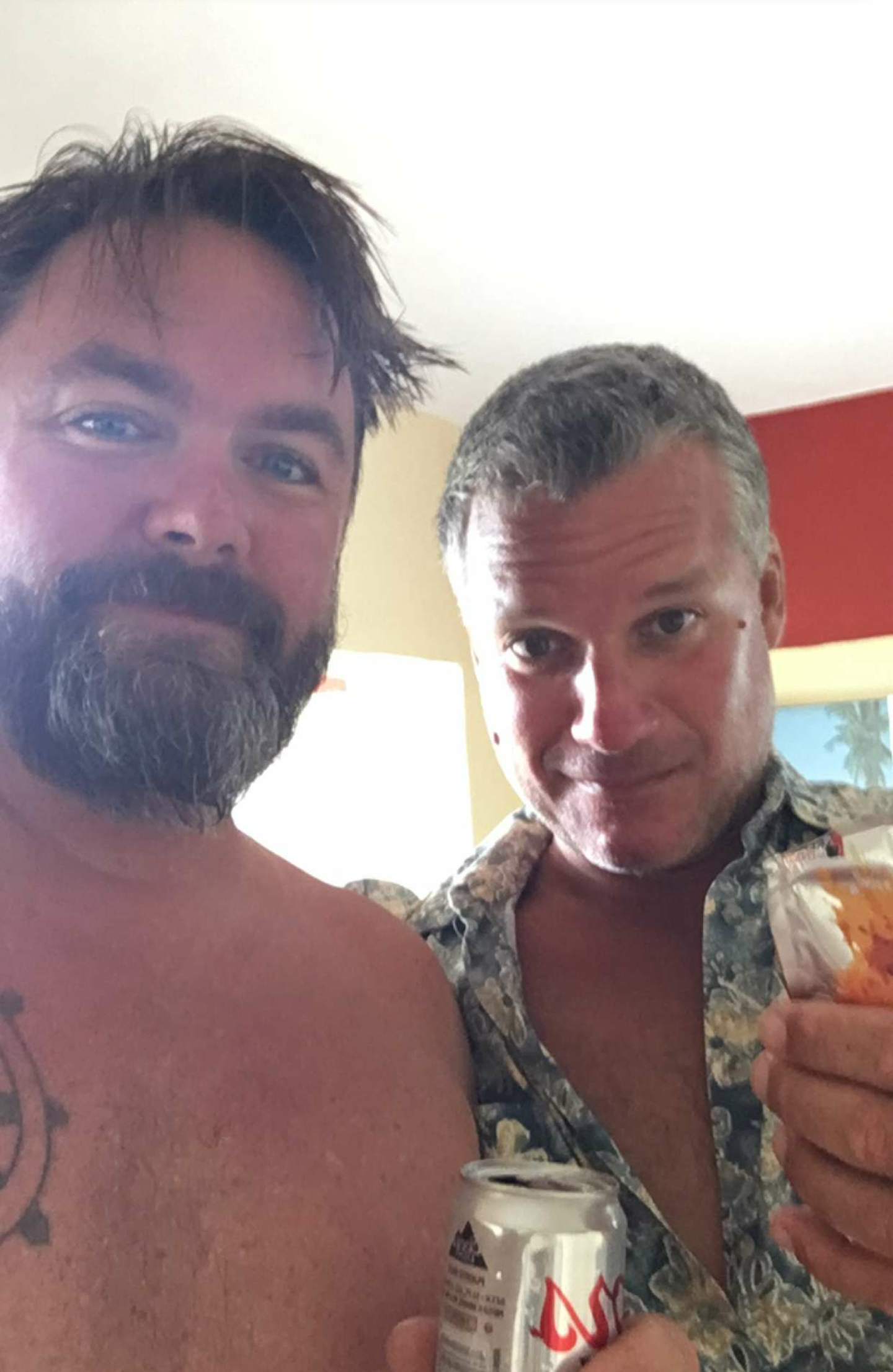
I knew it was time to write this because it’s been almost a year since the last time I inadvertently started to text him without thought. What tech does to us. For the first few months I caught myself doing that at times. Laura says it’s okay, that it helps. I’ve also met him in dreams. He’s always aware he’s gone and seems completely unconcerned about it there. It’s usually at the bar, where a lot of my dreams unfold. I haven’t seen him in my sleep lately though. Perhaps we’ve already discussed all that we can in that venue.
It was almost impossible to put any real thoughts into writing without first spilling this out of the bottle. I’ve emptied a lot of bottles in this time, but these words persist in floating back from the mouth, like chipped cork, perpetually rising up until at last flushing out into the glass of the one who finally empties it.
And in the interim I lost yet another friend from Vieques as well. Not entirely unexpected with this one, but another blow on the drumhead. It’s hard to work up the emotion I should feel. Grief fatigue.
We’re here for a good time, not a long time. Mike would’ve chided me for taking so long to just get over it. Well I’m not getting over it Mike, but I will get on with it. Again.
Laura and the fur-children are in Virginia. She’s become a grandmother of human kids as well – twice. She’ll be coming down to visit in a few months again. We’ll wear masks and sip on drinks at a distance. Or perhaps with our vaccinations the situation will be less dire. COVID is another thing Mike missed out on.
Most of the loose ends have been tied up, or sheared off. At least those I can help grasp. Surely Sea has a new prospective owner. I helped him and my friend Gustavo who refitted her put into the yard at Isleta Marina a couple months ago, to have another go at that damn propshaft seal. I think it’s solid now. The engine hums evenly even at those absurd RPM that Yanmars seem to desire. She is a beauty. Avalon sits across from her at Sunbay Marina now as the winter tradewinds run blisteringly, driving a cold, dry wind below deck and sudden unpredictable squalls briefly cross over us sending our dock lines squealing and grunting in protest.
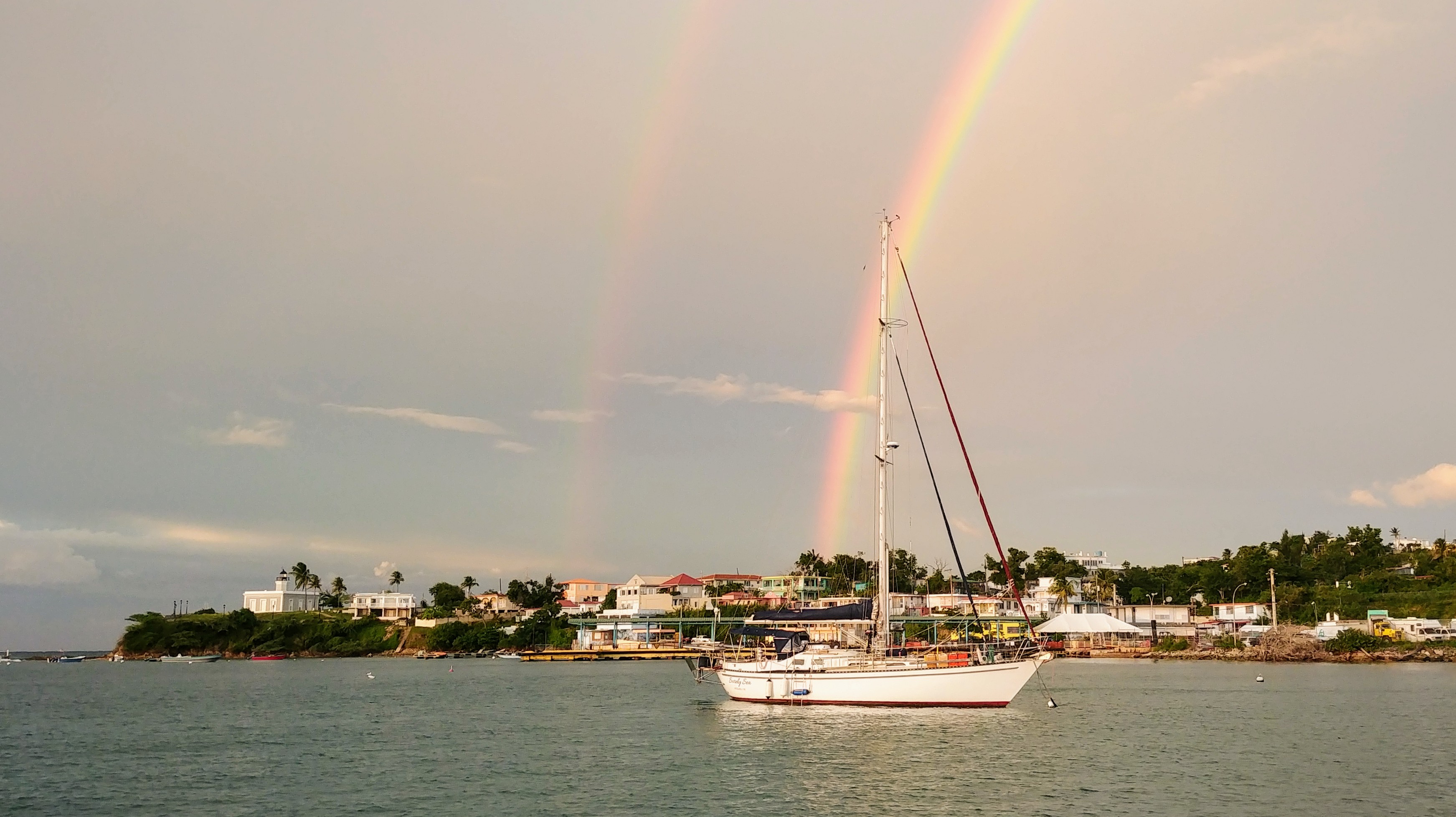
There are quarantine adventures in plenty to discuss, I’ve spent more time ashore in 2020 than I have in the last ten years. And I’ll have the opportunity to write about them too, I expect.
Meanwhile, next week we make for Vieques to find our mooring in Esperanza for the first time in nearly half a year.
Old Friends on a New Shore (Guadeloupe Landfall)
Pointe Noire, Guadeloupe
My first Caribbean carnival was on Dominica not long after hurricane Sandy swept the East Coast. Portsmouth afforded me a verdant, vertical wonder of waterfalls and cliffside gardens, and a swirl of people, colors, and sounds after my long year in flat, grey Norfolk. Anchored near me was Spellbound, crewed by a family from Martinique and other points further afield. French, German, Spanish and English were spoken aboard, and my daily row ashore soon had them as a regular stop. They extended an invitation just short of a demand that I visit them back at their home in Tartane after I had finished abusing my liver and wallet with carnival.
So I met with Matthias and Rebecca, their children, Rebecca’s father Bob, and his girlfriend Michele, as soon as my Dominica hangover had subsided enough to sail south.
Bob, Michele, and I subsequently disappeared into the Grenadines aboard Avalon. We planned to cruise for a couple weeks, but ended up voyaging for a month, causing some slight worrying back home with the family. But that is what cruising is: discarding plans and trying to assure loved ones left behind that you are well and happy.
I nearly ended up staying in Martinique upon our return. There have only been a handful of places in my travels for which I felt strongly enough to risk swallowing the anchor, and their windward village was certainly a bright candidate. It wouldn’t have been easy, as I’d have to quickly learn French and circumnavigate the circumstances of citizenship. But they strongly encouraged me to stay and try this life that attracted me so strongly. I nearly took that fork in the road, but an email from a friend requesting a rendezvous in San Juan (of all places!) ultimately shook me free of that quiet town before I could start seriously planning. I promised them I’d return to visit again soon, and six long years stealthily raced passed to leeward. They moved to Guadeloupe a few years back, and to an extent became shipwrecked on that lush shore.
It wasn’t long into this current voyage, just a couple months ago, that I received the text that Bob had passed away. Matthias asked for photos from our cruise of the Grenadines that he didn’t have and weren’t on this site anymore. As I worked to unearth them from the bowels of the server, I felt the press of time and grief, and the inevitably ephemeral quality of our lives, work, and dreams here on the islands. I wondered at the silly banal daily routines we employ strategically to inure ourselves to this certainty: “We’re here for a good time, not a long time.” These wise words I’ve heard from islanders more than once, on more than one island. But sometimes I ignore the admonition even while news of friends passing seems to arrive at a terrifyingly accelerating pace. I put my head down and push upwind through foul weather- both atmospheric, economic, and political. Why? What do I seek to prove?
I impart this inarticulately to Sara, even as news catches us that we lost yet another friend back in Vieques since we’d departed.
I want to be with my friends in Guadeloupe, and see an island spared somewhat by hurricanes, where my memories only touch briefly and are unlikely to be pained by stark changes and disassociation. It’s enough to mourn the absence of an old friend; too much to concurrently sift through torn up geography.
We motored in the massive lee of Guadeloupe nearly 20 miles and on this one occasion I am more than pleased we did. The direct route to Pointe Noire crossed the path of a whale spout. Sara once again flexed her prowess as a naturalist and identified it as a sperm whale, satisfied with the confirmation of its left-leaning spout of water. This is the first sperm whale any of us have seen. It stayed on the surface, spouting frequently, for 3 or 4 minutes, and just when we were beginning to wonder if it was injured or distressed, its flukes came up as it dove to abyssal depths, satisfied with its time basking at surface.
Seconds later, my cell phone received signal and welcome texts arrived from Matthias as he guided us to our anchorage.
“I’m holding up an orange life vest, do you see me?” He asked. The riotous mix of colors ashore eventually resolved and I picked out my old friend behind his seawall.
We idled past the float that marked the wreckage of their last boat and home in six fathoms, and where they later had scattered Bob’s ashes. Sara and I paused our usual landfall chatter. There lay volumes of memories mutely submerged beneath a humble yellow buoy close to port. The Caribbean is filled with such monuments, bearing silent testament to a few for a time, until the sweep of years and pass of storms inevitably wipe them away from the sea and living human memory alike. We are temporary here, and are constantly reminded of it. The weight of centuries blankets us until we join the past, ourselves becoming mere retellings of lost recollections.
Three young girls stood atop their old seawall tirelessly waving an oversized Jolly Rogers in fluttering sweeps to enthusiastically welcome us to their shore.
The shoreline in Pointe Noire at low water is a ten-foot-high, near-vertical shelf of huge round stones that could be employed for bowling.
“Who put all these here?” I asked Matthias.
“No one,” replied Matthias. “I wondered about that and asked someone who’s been here forever. They just roll down the river and pile up like that.”
“If Rommel had prepared Normandy with these, we’d all be speaking your language now,” I observed.
The stones are smooth enough and without hard growth to allow us to haul the dinghy up their steep incline. Keziah, Karla, and their friend Tatoum, who was on vacation from Martinique, greeted us in the morning and lit our way out with electric lanterns at night. The small mountain of “ankle-breakers,” as Sara called them, were a little more than a minor inconvenience.
Max was ecstatic to encounter these three friends here, near his age, who doted on him constantly, but in French.
“Shoopy-noo, Max, Shoopy-noo.” The girls chanted as they chased him, picked him up, and carried him away. Little Max at first looked at us helplessly; he’s too used to having adults listen to him with excruciating patience and understanding, and his responses in English were of little use. I shrugged. I don’t know what the hell they’re saying, dude. Though Rebecca assured us later that it meant something like “cutie.” They could have been discussing what seasoning to employ in cooking him for all I knew.
Although I met them in Martinique, their family had previously lived on this island, and Rebecca’s mother and sister still live nearby. Matthias once ran a restaurant somewhere near here – indeed he spent hours daily cooking for our large gang with some intimidatingly exotic cuisine. He greeted us with a pana souffle that was soul-inspiring.
“Was this a regular dish you served?” I wondered aloud between mouthfuls. He shrugged, crossing his arms.
“No, this is the first time I made this.”
French chefs – and at least one German I know – can casually prepare kingly meals without meat. His cuisine is mind-altering, although I sometimes suspect that he finds our vegetarianism left of eccentric. I struggle to explain how I lost my taste for flesh, and the (to me immediate) economic and environmental consequences of seafood, though they have quotas and licensing here that are actually enforced. Tropical fisheries are far more fragile than their northerly counterparts, and we don’t do a good job. There isn’t a Fisheries or law enforcement vessel in the waters of Vieques – even before the hurricane, except for some unscheduled transient police who scurry off soon after checking in.
As expected we find the hot Scotch Bonnet so easily grown here. But as with the rest of the Caribe, the French don’t like food spicy. Matthias pickles some of these peppers in escabecha (and graciously sends us back home with our own jar full), and introduces me to a very aggressively prepared paste sold commercially here (but not seemingly often used by local restaurants), and a tube of a Moroccan red curry-like paste. All of these spicy treats are met with actual screams from the three girls as I consume them.
The French Caribe are completely aligned with living a good life in context of family, food, health, socialization, and a plenitude of meaningful leisure and recreation. Time enough here to love. If you’re a citizen of the European Union, the basics are very easy to come by here. Beyond that, it requires vast amounts of work like every other island I’ve met.
Oh, the ubiquitous wine, wide-spectrum array of cheese (which sometimes seems consumed based strictly by mood), and the local agriculture! How I long to see our little island flex its dormant agricultural might as a modern tropical produce exporter. Ah, but the Jones Act, the way the US capriciously outsources to slave labor (especially sugar!) to save a penny on the dollar, the contaminated soil on the Vieques windward side, and the post-colonial hopelessness observing US mainland farmers receive outrageous subsidies to not produce, while the terms of our territory crush us with cheap, rotting imports.
The French protect and nourish their agriculture, their land, and their people – at least here in the Caribbean. Our notion of free-trade-Laissez-faire-capitalist-bullshit ideology rings hollow: results count. If you protect your agriculture and provide government social services, education, and healthcare as a priority, a better life and economy is what pops out of the vending machine. Still there are a few rich oligarchs way up in the hills out of sight of the working commoners, but who cares anyway? The surest way for the wealthy to protect themselves from the guillotine is for them to pay their fucking taxes like the rest of us. Why do they get this wrong every time? Do they think the rest of us don’t notice they’re cheating?
We are lulled from these thoughts on most days. Our friends manage properties for rent and for snowbird owners. We are intimately familiar with their trials and travails. Property managers are the worker bees of the Caribbean, the base of the economy for vacation rentals, the first people who see the money that actually comes ashore, after the absentee owners have pocketed their slice and stowed it, usually offshore. We depend on them in Vieques, as often they are the first to give the critical initial orientation to visitors. We receive a large portion of our passengers thanks to our friends that bear the brunt of leaving in the middle of a party, drink barely touched, to hurry to the tardy ferry to greet and deliver new guests to their rentals. This lifestyle requires a dexterity and cleverness of mind and hands.
The upshot of course is access to those houses, laundry machines, swimming pools, and often getting accommodations in an empty property, if they are willing to refurbish and maintain it during their employ. Matthias and Rebecca show us the before-and-after slideshow for their beachside home, converted from a dilapidated, abandoned restaurant. The images of careful hands laying masonry, banging out windows, painting murals, and constructing sturdy palette furniture and lawn toys for the kids, are all hauntingly familiar, but the timeframe leaves us astounded.
“You did this in two days?” I ask seeing pictures of the remodeled kids’ room.
“Well, most of it.”
“Even the fish pond?”
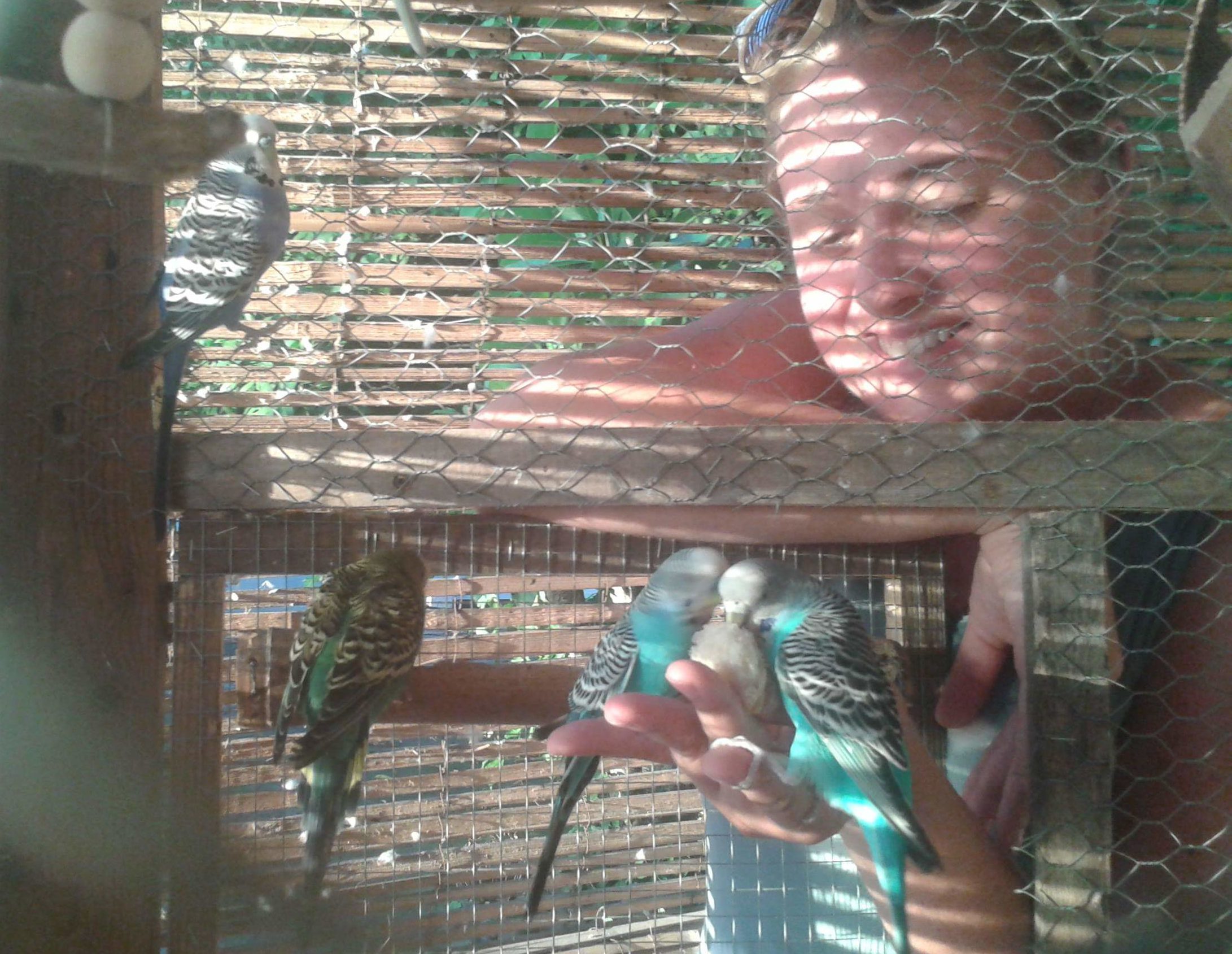
In one corner of the large open living space a cage of parakeets hangs. The budgies bicker, clack, peck, and generally enjoy each others’ company. Rebecca tells us that the little turquoise female adopted herself to the family recently, having flown down from a tree to light on the cage and wait patiently to be let in. She stayed mostly in her handmade Calabasa shelter during our visit, nursing her five new hatchlings.
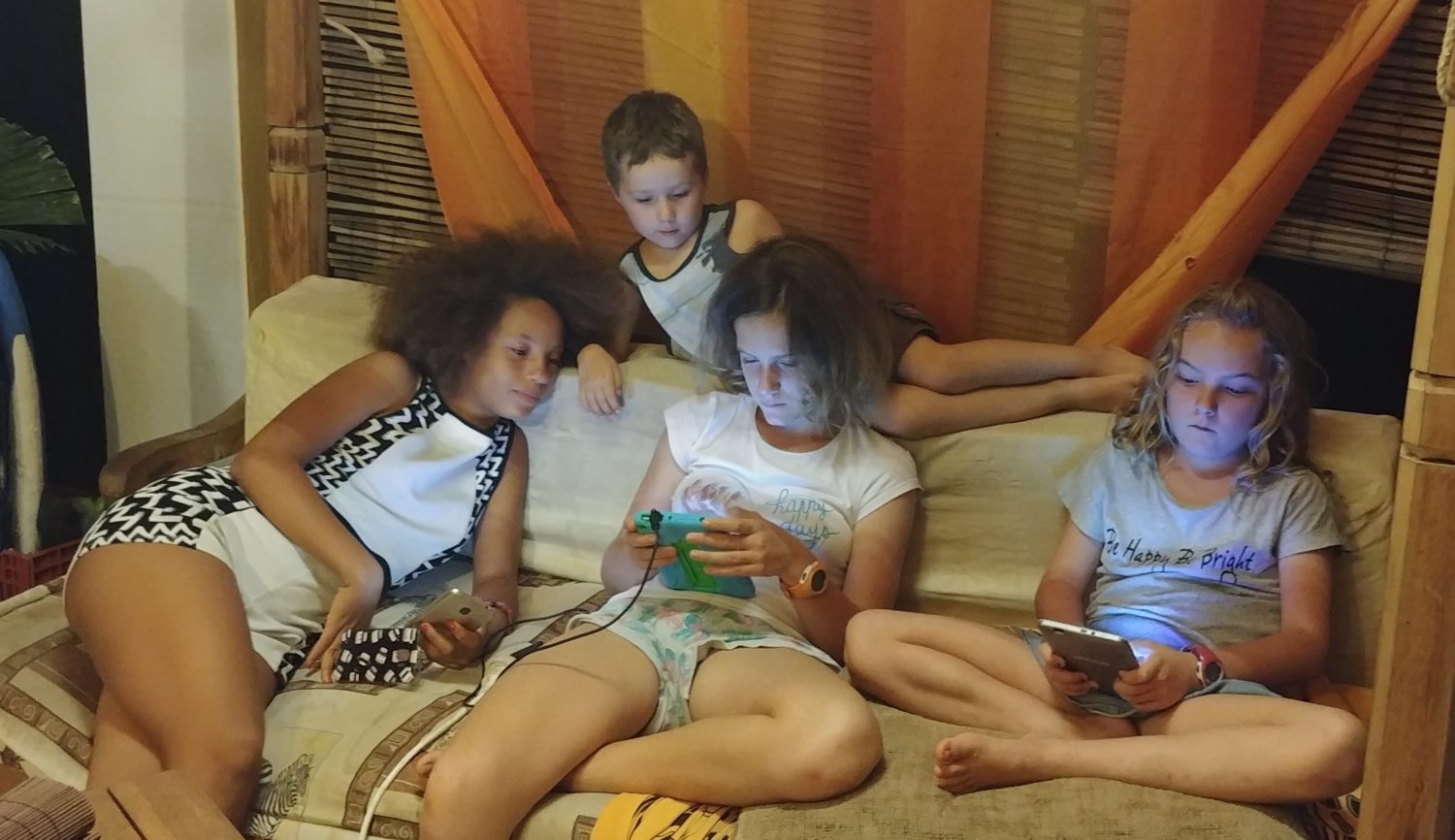
Opposite the budgies, rocking on a palette-built swing-couch, the children bickered, clacked, pecked, and generally enjoyed themselves, immersed in alternate digital terrains, passing tablets back and forth. It’s hard to tell if the colorful birds, or their mammalian counterparts conversed more meaningfully, or which appreciated the vast spread of Caribbean sea lapping up just feet below more profoundly. Or maybe it’s the chickens as they sweep the ground outside their coops, or the cats, one of whom still misses living at sea, that stare into the unbroken blue line to the west and wonder what lies beyond. For me, I’m happy to spend a few minutes with my back turned to it, sipping wine and beer with my friends in the shade. Sometimes being ashore has some virtue. Don’t tell anyone I said this.
Matthias helps us to arrange a car rental, and mentions there are a couple of Belgians who live a short walk away who may be interested in sailing in a few days. We’re happy to have something to fill our unusually empty calendar…
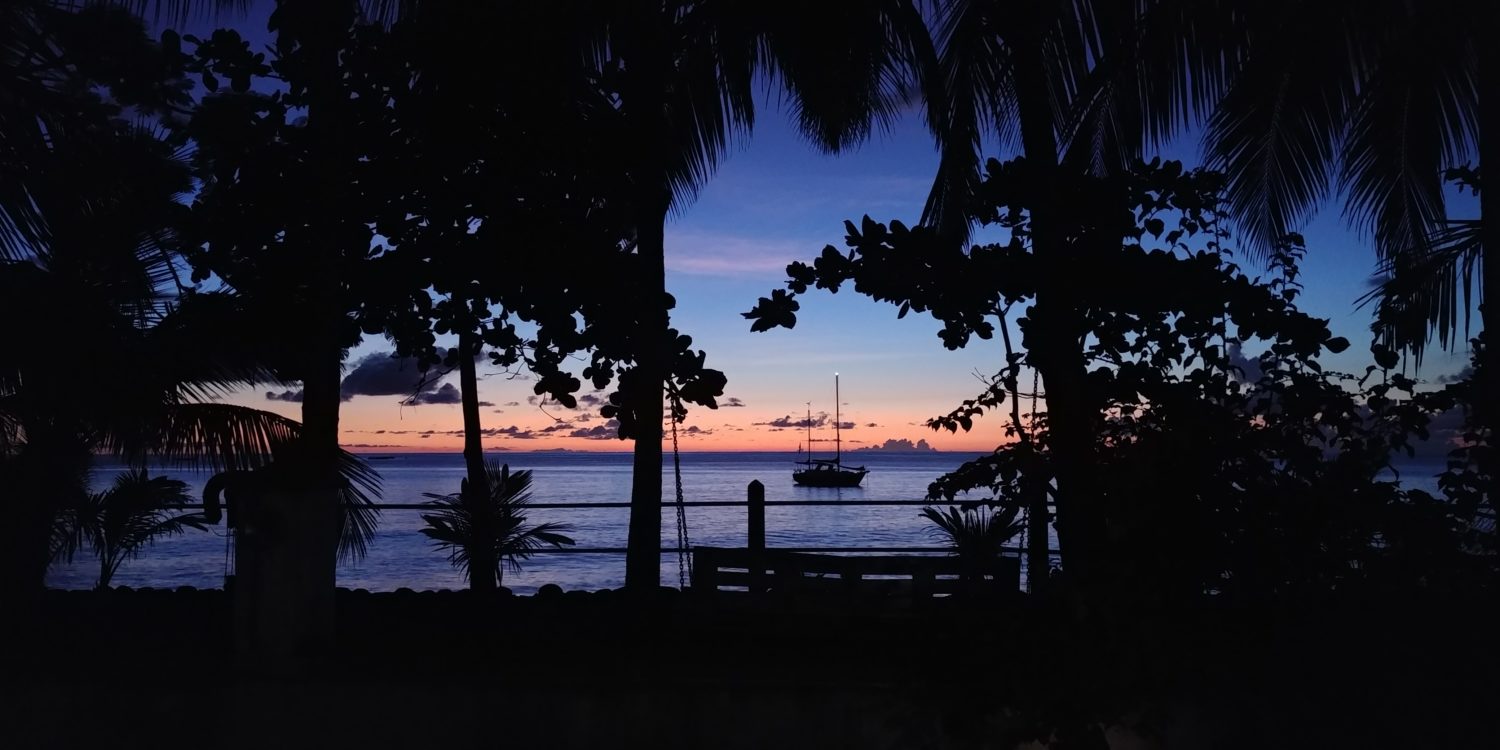
Upwind to Guadeloupe
It hit me square on the head with an audible squish of bones and secretions at the end of its last flight before pathetically flapping and bouncing on the cockpit sole, its wings now useless to forestall its doom.
“Ahhh! Fuck! Sara!”
“What? What? What?”
“I just got hit by a fucking fish!”
I rolled back the blanket that had been shielding me from the sharp wind and examined the wet slimy mess the flying fish had splattered. Sara recovered the animal from the sole and launched it back over the lifelines. I rubbed my head, disconsolate, and stared at her in rueful silence before rousing from my early morning rest so rudely interrupted. The sky was lightening, the loom of Guadeloupe far over the Eastern horizon fading quickly. I admired my brief acquaintance’s ballistic journey through the dodger to tragically fetch up against my noggin. It was quite a feat, and now another reason to sew in isinglass windows when we finally rebuild it. I gave awkward, quiet thanks to the dying ESE wind that roared so fiercely the previous night, as we rolled in the lee of distant Guadeloupe. Had we been making hull speed, I would surely have sustained an embarrassing injury from my scaly interloper. The dolphins playing with our wake the day before were much more polite.
Sara soothed my (largely emotional) hurt and surrendered her morning rest without complaint and with angelic grace. She sniffed the blanket before folding it and winced.
“Now it smells like pee and dead fish.”
This kind of thing is part of it.
I popped a breakfast Caribe and took stock navigationally after our second night without sleep. Sara scrubbed the scales and slime left from the fish’s mad flopping death waltz around the cockpit down the scuppers. Wasn’t this supposed to be the easy leg of our cruise? I sipped my beer and fell into the inevitable review of our last port of call, as mornings such as these instigate.
***
St. Martin (or Sint Maarten depending on the day) had sunk its sticky-sweet claws into us as I knew it would. Oh! They are masterful merchants and dealers! Everything is so inexpensive in comparison with neighboring islands, you end up spending in an orgiastic gush. Where our usual frugality rules, we spent like wastrels in a hard vacuum of zero sales-tax. St. Martin will part you from your pocketbook and you will thank them for it.
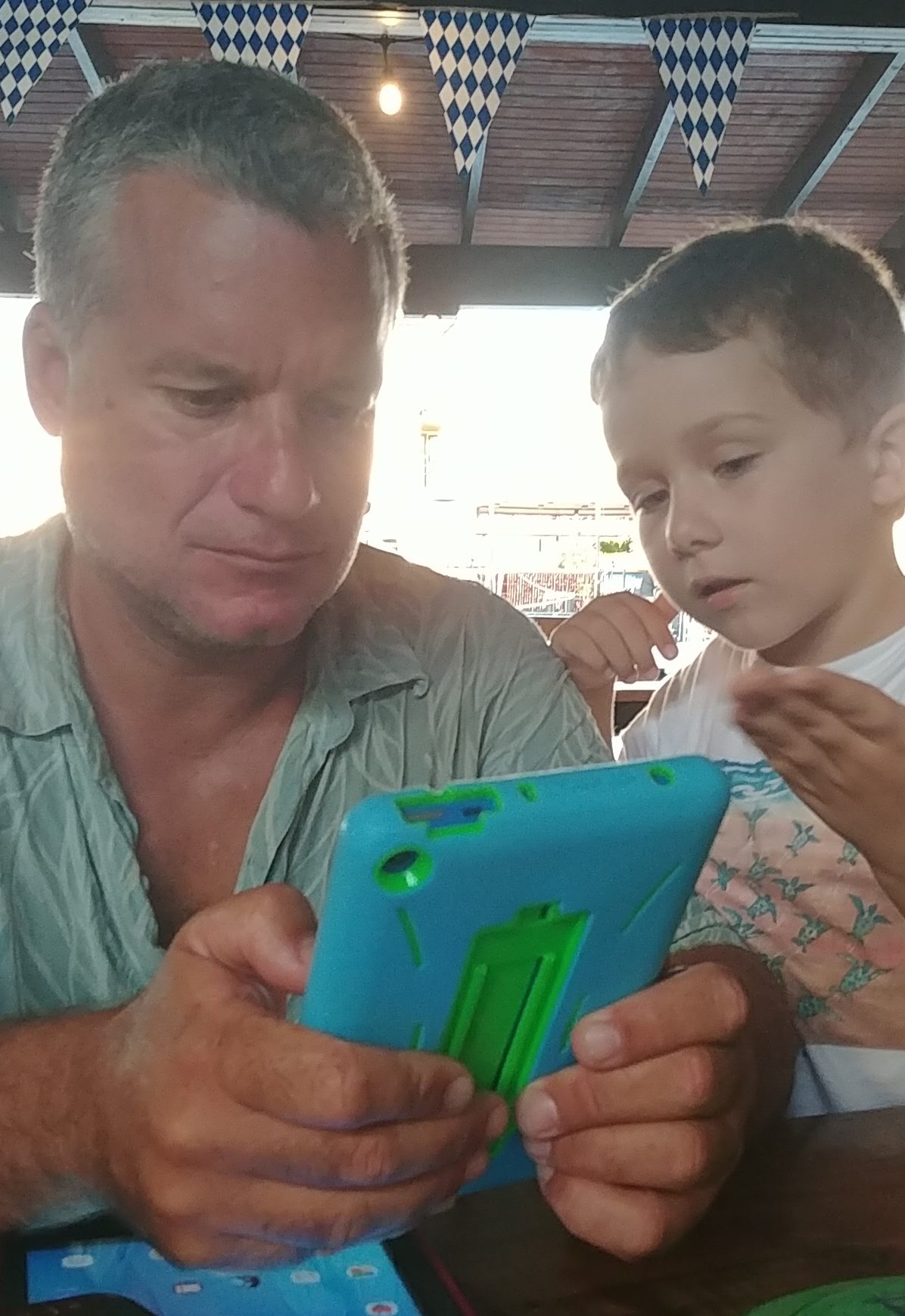
We rented a car in Simpson Bay and headed over the hill.
“We’re in France?” Max exclaimed delighted as we drove past the Friendly Island monument and the (mostly) invisible border. We changed money in Marigot and I tried my best to keep my shit together as we walked past the wreckage and forever-closed businesses I remembered here. I anticipated what awaited on the North side, as Mike and Laura had well described how the French side was not recovering with the same alacrity as the Dutch, back when we shared the anchorage with Surely Sea at White Bay. A few weeks stretch like years ago, but those two sailors have keen eyes and a patient way of reporting when others are in an excited rush. Their cautionary description cushioned the blow of more wondrous places I adored, now erased by Irma.
Jean-Baptiste and Paula still have their restaurant Le Sous Marin behind the Marigot Cemetery, a stone’s throw from the sea. We enjoyed fresh panini and quiche. Next door my favorite bar on the north side, Le Flibuste had been converted to Parquois Pa?, with an unrecognizable crowd of older, clean-cut French men displacing the mosaic of riff-raff, reprobates, ex-pats, Displaced Leather Euro-Trash, and end-of-day paint-speckeled boat-yard sailors with whom I had spent weeks inebriated last time through. I looked at Sara and motioned to move on. My place was gone, or at least absent today. We went to find Max his promised scoop of ice cream.
After much wandering and some driving in circles, I finally remembered the location of Super-U on the outskirts of Marigot, and we pulled into the parking lot with much relief. Sara and I ran around with 100 Euro like little children and probably confused the hell out of Max. Wine is even cheaper than I remembered, and not just from the stronger dollar. The dizzying array of wheels and wedges of top notch cheese, quality-calibrated vegetables, and enough baguettes to constipate the entire US House of Representatives (although few would be able to tell the difference) had us near tears. In Vieques we often buy produce from what many locals call The Museum of Vegetable History, so the tiny pink-and-white radishes, fresh plump red currants, and sugary sweet golden plums were the stuff of dreams.
We shared a serendipitous conversation by the potatoes with Dee, a soon-to-be good friend. After barely a minute we get that she is One of Our Kind. Or we are perhaps hers. I took her WhatsApp number and Sara and I attended to the business of prioritizing our purchases, as we have limited Euros and much wine and cheese and produce to buy. I ran some items back to their shelves, before the total indicated a sum well below our 100 Euro. Is it possible? We high-fived and I did another lap pulling those items back into my cart and paying for them in a second round. By the time I made it back into harsh tropical sunlight, Max had finished most of a fresh baguette, his eyes glazed over in wonder; this was a game-changer for him too. Throughout our stay he would consume around 7 more.
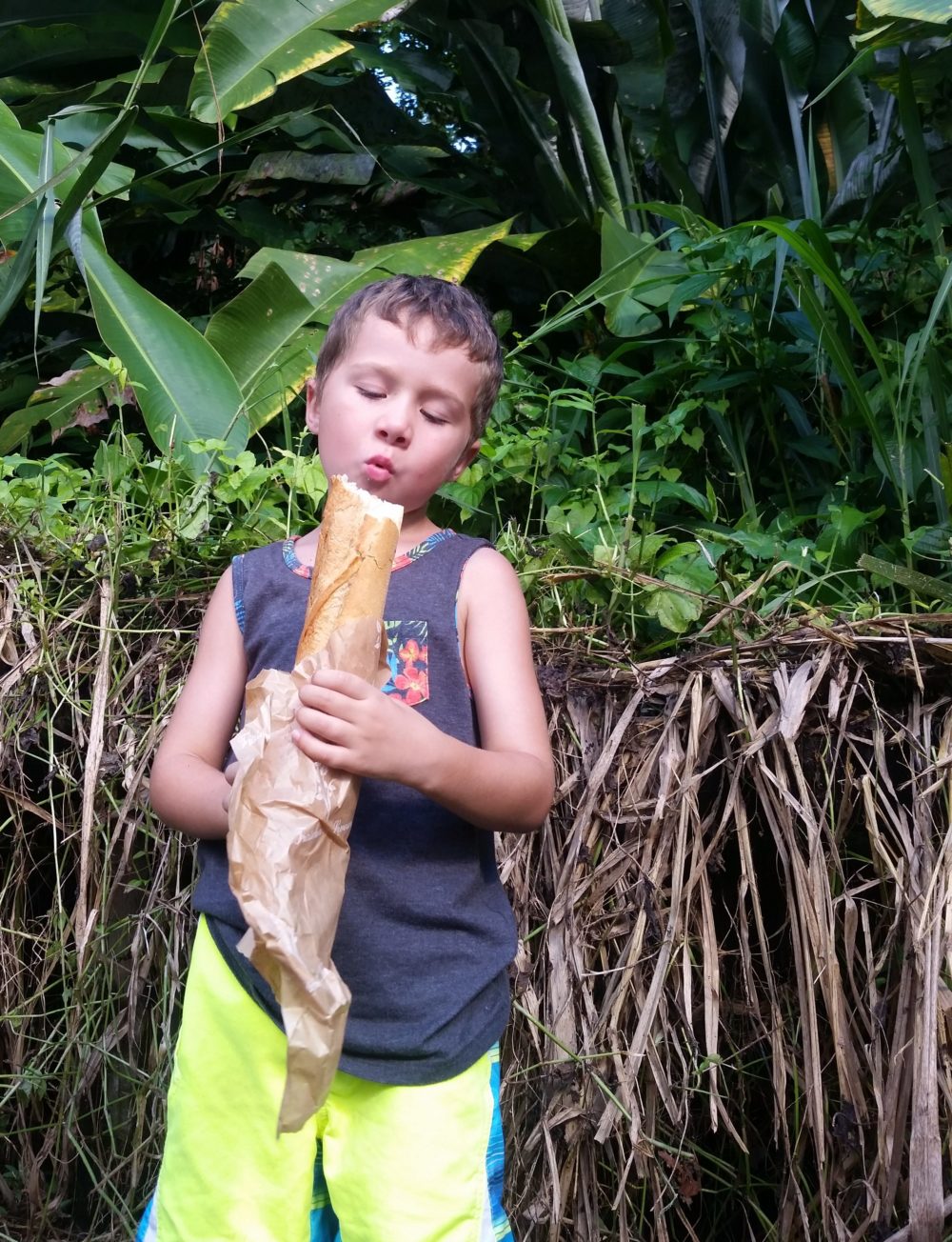
One more night’s stay became two, as we desired to visit with our new friend. Dee’s house is situated in a maze of roads to the West of the lagoon on the French side. Her directions were typically islander, as there were no street signs. They were spot on, except we took the “lowlands” entrance instead of the main one and drove around for miles… or kilometers, rods, or furlongs before finding the correct entrance upon which to apply her accurate instructions. Dee had flown down to put her house back in order for a few weeks, collecting hurricane shrapnel from the yard, and interfacing with local utilities. We sipped beer, ate her artichoke dip and were serenaded by an unusually stealthy heron of some kind with a strange call that sounded like “What!” She outlined her struggles in a reflection that stretches through almost every island out here, to maintain her place as a guest house for visitors. Bureaucracy, inefficiency and outright governmental neglect transcend all language barriers. Fortunately for her, on St. Martin the outright institutional corruption and larceny doesn’t thrive to the extent that businesses on Vieques routinely cope with. But Dee reminds us we are now actually in France, not some half-assed colony, territory, or administrative zone. French, Dutch, Danish, British, Spanish, and finally, late to the game, Americans, colonized Puerto Rico with vastly different styles and various different aims. At the bottom of it was always resource extraction, blackpowder warfare, and slave labor (in the case of the US colonies they weren’t slaves per se, but you’d be hard pressed to tell the difference from photos of the late 19th century sugar workers’ conditions).
Our two nights extended stay became three as we missed the bridge lift trying to pay off our exit fee to customs. I fumed. We’d had such a miserable time getting our debit/credit cards to work on this voyage. We’ve probably spent three solid hours on the phone to banks who assure us that now it’s “all fixed” to find the next day that we can’t access what little money we’ve elected to keep in our account. I’m looking at you Banco Popular.
On the opposite end of the maritime-monetary spectrum, there are two early season mega-yachts in harbor: Turquoise, and Imagine. I doubt their owners have held paper cash in their hands in the past decade, except on a lark. They hire people who hire managers to run madly ahead and pay for everything, including sending an agent to customs with a satchel of passports. When you have that much money, it changes into something else, something other than a device to borrow, buy, and trade. It becomes its own entity, a transcendent, politically active, acorporeal, amoral being that pursues its own ends. Regardless of whether the owners of the immense mega-yachts “earned” that wealth (which I maintain is impossible for anyone’s labor or smarts if there were a fair balance sheet in the world), they merely now ride its coattails as it bludgeons about internationally, a monster with countless eyes, fingers, inhuman appetites, and ultimately no accountability, beyond its own bottom line.
Oh, and everyone at the yacht club saw you as you dawdled out of the Simpson Bay Bridge with ten feet clearance on either side of your beam, Captain Fancy-Pants aboard Le Obnoxious Mega Yacht. Stop jockeying your bow/stern thrusters! Go ahead and hit the gas and get the hell out of my way. Some of us work for this.
We spent one of the rolliest, most sleepless nights in my recent memory anchored north of Brimstone Hill on St. Kitts before passing beneath the plume of the volcano on Montserrat the following night. At midnight—it’s almost always midnight—just as the sulfur reek subsided, the wind kicked, gusting to thirty in tightly spaced squalls. The lee jib sheet fouled a loose flag halyard, spinning itself in a Gordian knot which I spent half the midnight-hour yelling and picking at in frustration as Sara kept the helm just off the wind, which veered to South-of-East, and we were forced away from Guadeloupe into the Caribbean.
On the bright side, we had plenty of good beer, wine, bread, and cheese. Sara’s father lent me “Bicycle Diaries” by David Byrne who amusingly sings to my political choir. So who needs sleep anyway?
Anagada Passage
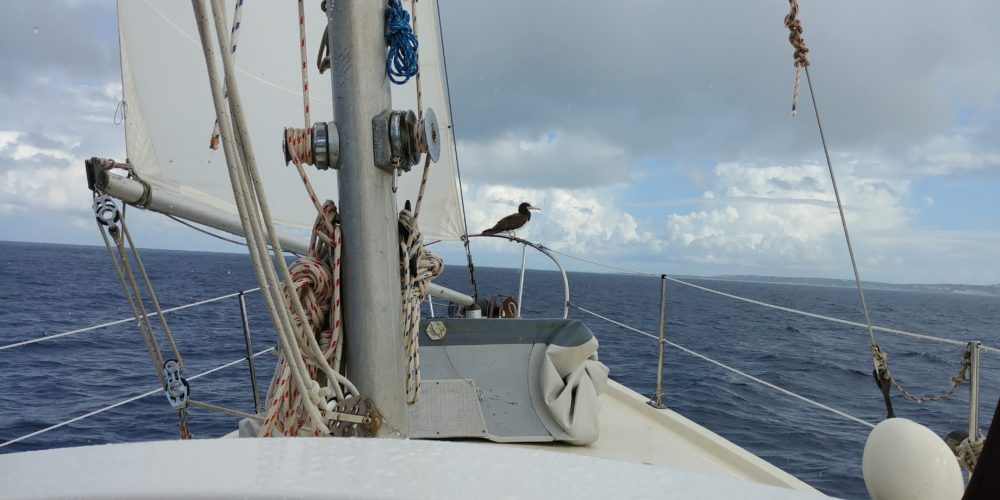
We’re sipping coffee and listening to French radio on 105.9. To be fair, it’s a French station rebroadcasting here on St. Martin from Martinique, and mostly what they play is a schizophrenic-eclectic mix of our favorite oldies, mixed with favorites we never knew were our favorites, with a sprinkling of some French selections just to remind us we’re visitors here.
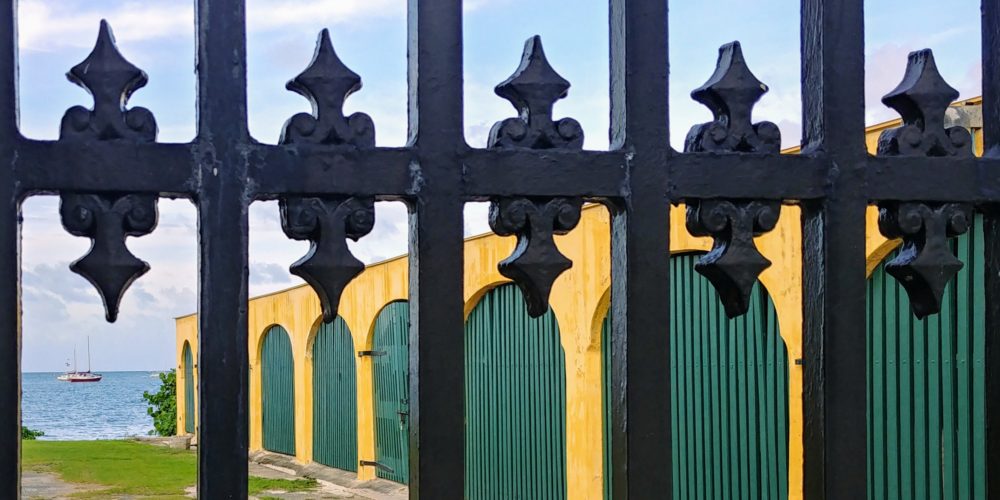
A few days ago we departed Christiansted, without having hardly made her acquaintance, but having met folks who knew Vieques and her people well. The sometimes melancholy relationship that Vieques shares with St. Croix can be easy to overlook, until a Boricua kid–absent shirt, shoes, or hat–rides past on the narrow, ancient streets, astride a Paso Fino saddled with little more than a blanket, shouting to his friend in Spanish, and suddenly I smile, briefly forgetting which island my feet are dry on. But only for an instant. St. Croix is not Vieques, nor Puerto Rico. Still, many descendants of Viequense live there now, a flow stretching back three or four generations.
We weighed anchor with a promise from NWS of 6 foot seas and 48 hours of ENE at 15-20 knots – exactly what this old cow of a boat wants for a crossing to the Windward Islands.
As if.
We saw 10 foot seas around the east end of St. Croix with 25-30 knots whistling through our shrouds. Maxwell was so concerned that he started playing on his tablet upside down. Sara took the first watch, but there was little sleep that night aboard Avalon, as she reached as close as her rig would allow, racing and beating to skirt around hourly squalls. So after all the plotting and planning and weather guidance (which I must say has been spot-on for the big atmospheric events) we ended up beating across the Anagada Passage – exactly what I had hoped to avoid by transiting far to the south. Still, we all did well with it, ship and crew.
Saba reared on the evening of the second day, and rounded in darkness, its lights a pearly necklace high in the sky above us as we ghosted in her lee. In the morning an old friend came to roost on our rail as I replaced the engine’s impeller below while Sara made short tacks for the last mile, through an Easterly line of squalls into Simpson Bay. When we fired up the motor we were rewarded with an enthusiastic gush of exhaust water from the transom. Upon entering Simpson Bay, we squeezed in front of Poema, the Dutch Antilles Coast Guard ship, that graciously allowed us to pass beneath the bascule bridge before them.
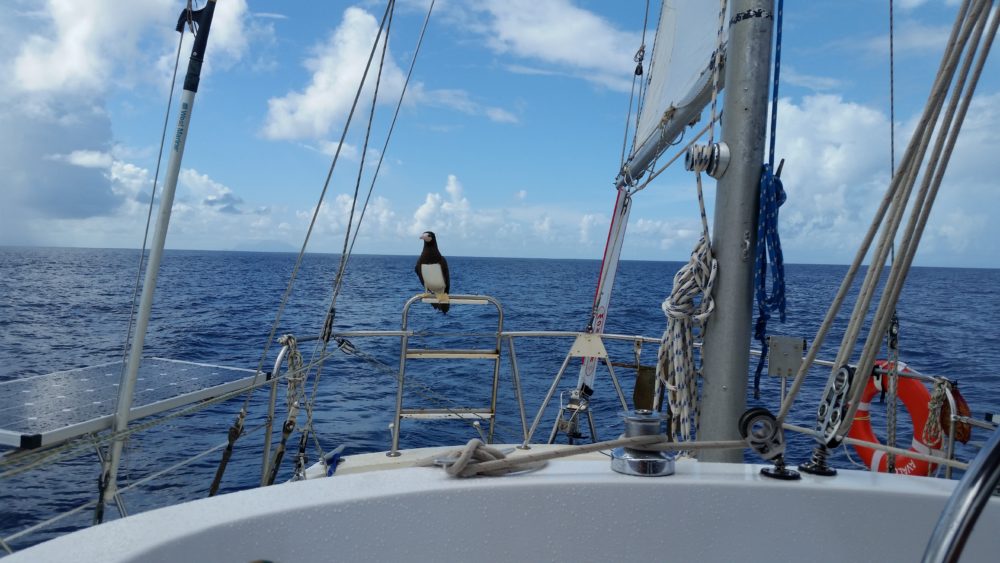
It’s going on six long years since I was here last. Some things are unchanged: customs and immigration in the police station by the Simpson Bridge giving me a double ration of shit for not having exit papers from the USA (whatever), the dizzying array of international restaurants ashore, the yacht club, the Soggy Dollar, Garden Market, the scuba shop, the garish lights from the casino, the seedy strip-club, and all the
prices still listed in Antilles Guilders (but the Protestant God have mercy on your soul should you try to pay with anything other than green USD on the Dutch side).
Everything else is starkly different, courtesy of Irma. The perennial fleet in the lagoon anchorage inside the waterfront is eerily vacant, with the speed bumps of capsized boats threatening the shallows, and hulls covered with growth from a year submerged, recently floated again. The fingers and docks have been swept clean away from piers, boats now tied extravagantly beam-to between the stumpy remains of pilings. The Juliana Airport – one of the least painful landings in the Caribbean – is shattered and shuttered, the boarding facilities now temporary structures erected in the margin.
Still there are hopeful new sprouts of rebuilding as well. Seth recently opened the Dinghy Dock on the west side of the Dutch lagoon, and that place has tickled our fancy. They even let little Max sit at the bar, sipping his iced mango juice through a cut of natural straw – at least until our food came. Everyone flirts shamelessly with the little man until he creeps out from behind his mother’s dress to give a fist bump (or a hug and a kiss as tradition and social convention requires).
Much to our delight, Dinghy Dock has a selection of “leftover beer” for cheap fucks like us—the last few cans of a craft run they no longer carry, or that are a bit past their prime (dealer’s choice; no complaining!)—and we were blissfully surprised when some quality brew got pushed in front of us for $4.
The Juliana bridge now divides the lagoon, a raised maritime frontier between France and the Netherlands, erected with the wistful hope of relieving the unimaginable traffic congestion over the hill to Philipsburg. I would prefer to simply motor across the narrow half-mile in darkness, avoiding the inevitable customs mess of check in (and out) as I did routinely years ago, but with the necessity of radioing the swing bridge, we’d be on their crossing list – an inconvenience exacerbated by the non-functional Sandy Ground bascule bridge west of Marigot on the French side. The days of quietly crossing over water between countries on St. Martin are over – at least for now.
Tomorrow we’ll look to rent a car to visit the French side and take on cheese and wine with the hope of a strongish dollar which our administration has not quite managed to tank against the Euro. Yet.
A deep, aggressive tropical wave passed over us yesterday, keeping us on casual anchor-watch in this poor holding and collecting enough rain to thoroughly wash every article on the boat this morning after filling our tanks. Max and I stomped the wash into soapy water that collected ankle deep in the dinghy overnight. This ritual of cruising is a return to roots of sorts. Our lines are adorned with cruiser’s pennants; our clothes pinned beneath a drying breeze. All is somehow right in our world in spite of all the wreckage bearing mute witness to the contrary.
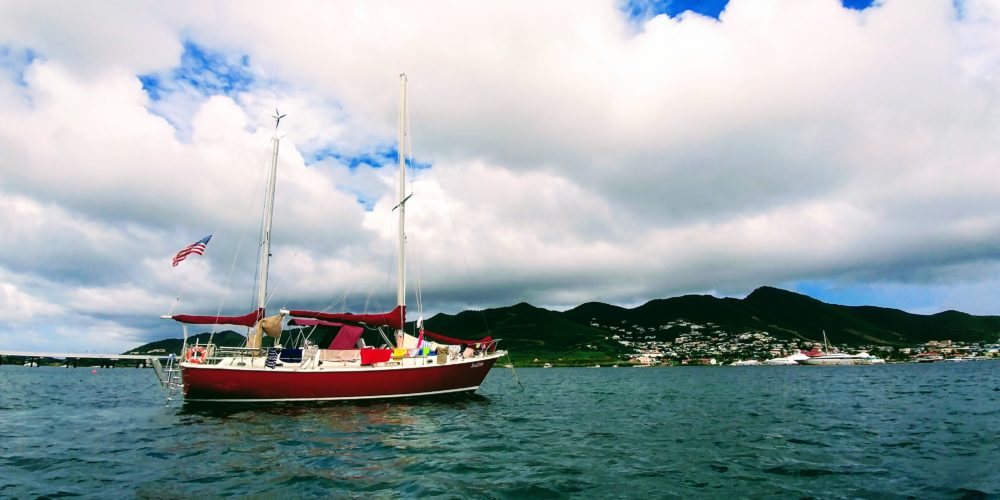
Sara wants to make landfall on an island that hasn’t (recently) suffered a Cat 5 hurricane and remains innocent of the chaos and disorientation that follows for years. I wish it too. I’m tired of saying “It used to be like…” and “I have no idea what we’ll find now.”
It isn’t adventurous; it’s become morbid.
Lurking in the near future looms our turn-around date to return to our own torn island. I wake sometimes dreading the prospect of a high season that never materializes on Vieques. I worry the scant aid we received dries up from indifferent, and at times openly hostile local and federal governments. It’s a thin thread that keeps us from descending back into dark nights and our airport and pier silent and empty for want of tourist traffic to service.
There is still time now to press on to the south where storms rarely touch and the water stays warmer all year long.
Back in the BVI
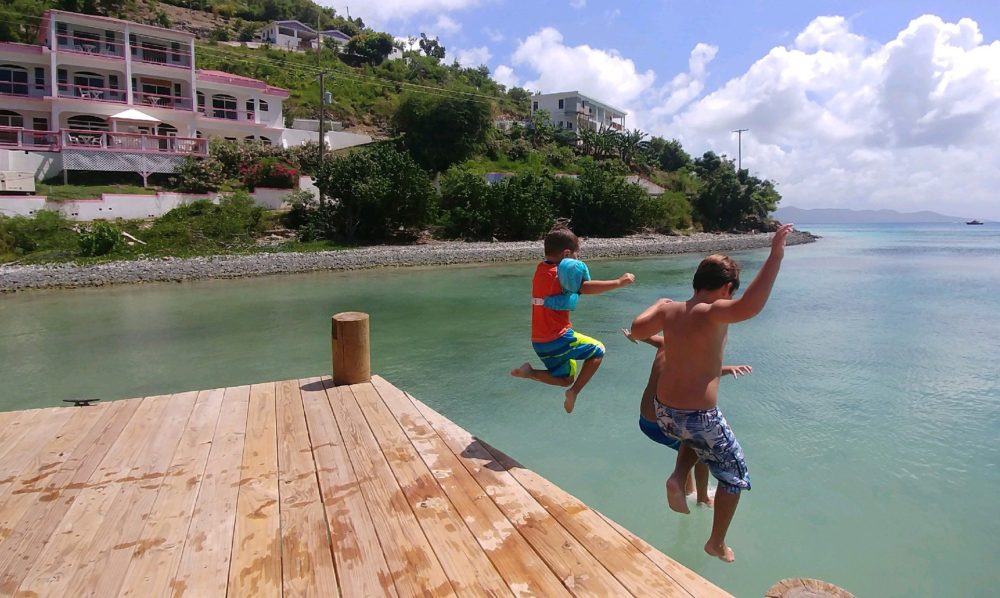
I explained the proper use of the yellow “Q” flag as we made for Jost Van Dyke in light Easterly wind. We took a ball in Great Bay and surveyed the damage from Irma. Corsairs and the dive shop were rebuilding with a frenzy with hopes to complete before start of season. Foxy’s survived just fine, with the eponymous owner holding court and playing guitar with some visitors from St. Thomas. We flew through customs and immigration, returned to the mooring where Max and Sara hoisted our BVI flag. White Bay was its resplendent fine white sandy self. Soggy Dollar finished rebuilding and was serving up Painkillers. The ring game tree was gone, replaced by a post of wood which is much more difficult to land.
Tortola is scarred from Cane Garden Bay all around to Trellis Bay, where the fleet – dozens of boats – are still laying high and dry where they were thrown. It was heart breaking. We landed at Aragorn’s but they were not lighting the fires for full moon parties until later in the year.
We watered and provisioned at Spanish Town in Virgin Gorda, where the eye had passed over, again trying to imagine the scope of the loss around us. The Virgin Gorda community was as friendly as I remembered, and helped us locate where the stores had moved and one passing truck even stopped to give us a lift back – something I never experienced before the storm here. On the other hand, having Sara and Max laden with groceries beside me may have inspired the charity. Remember, they drive on the left hand side here.
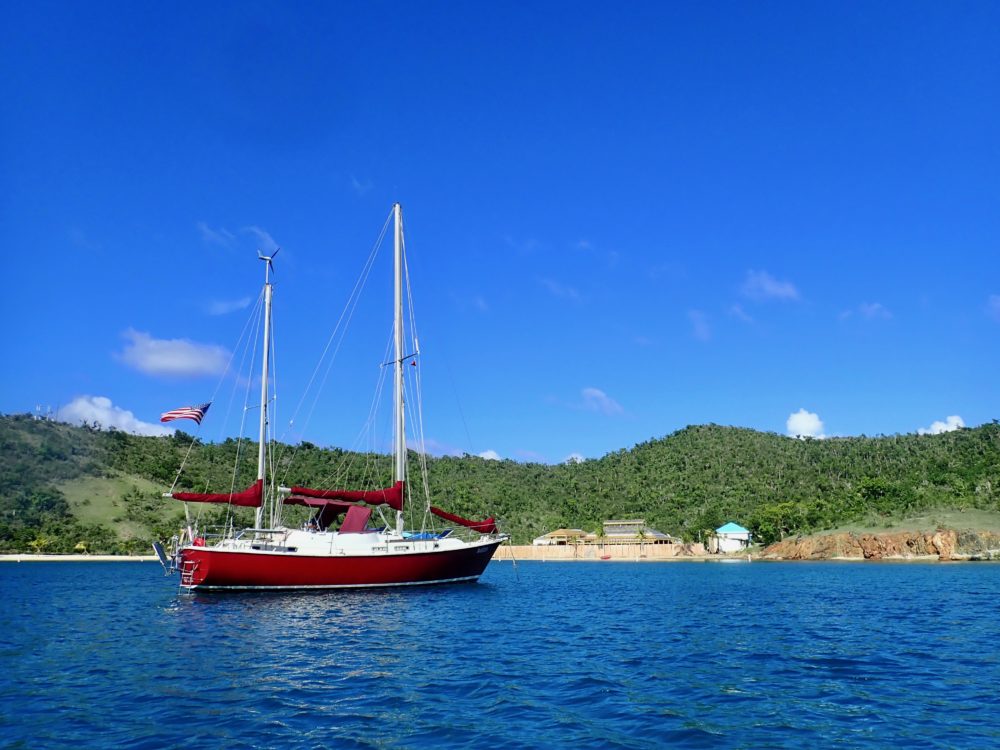
Cooper Island was closed for summer. But we received the news that their brewery still functioned. We paid our respects to the HMS Rhone by Salt Island, gave a pass to Peter and snuggled into Norman Island, where we anchored alone aside from the wreck of the old William Thornton to wait out the passing of what remained of storm Kirk to our south.
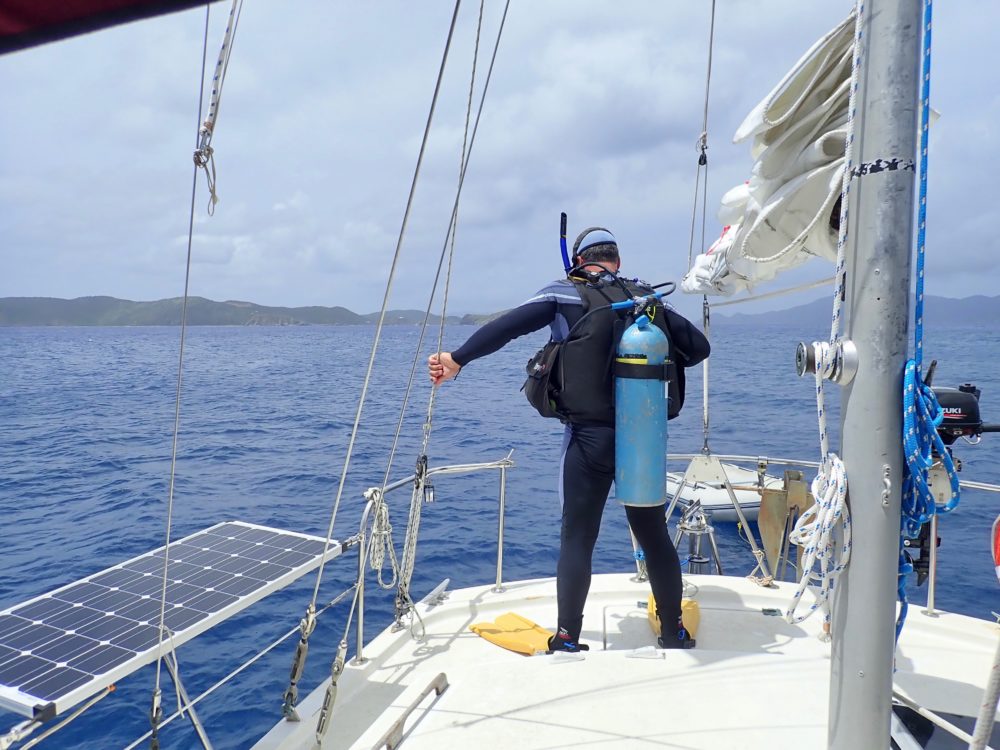
Capt. Mike and Laura aboard Surely Sea are returning from St. Martin! We found that we could not extend our 9 days for some reason the official at immigration couldn’t make clear at Jost, and faced beating back to Road Town. We needed a visit to the bank anyway, so we checked out, made for St. John, checked in, motored up to Soper’s Hole in glassy seas, checked in again to BVI, threw back a couple beers with Kiwi Sean (whom I had not seen for a couple years), and motored to Jost where Mike and Laura were already set at anchor behind the reef at White Bay putting down drinks. Angry, tired, exhuasted, down $40 for the extra customs stop, and having burned through several gallons of diesel, we anchored beside them. Yup, this is normal for the Caribbean. Coming back to US in Puerto Rico will be even worse, as the fancy new phone app for automated pre-checkin seems to have some serious glitches. Or maybe we were just being ignored. Please bureaucrats, surprise me with competence and efficiency just once, somewhere.
We’re planning to stay here and catch up until the weather changes on Thursday, head up to Nanny Cay, provision, water, and step off for the Windward Islands, or wherever the wind may land us. We’ll be out of touch for a few days making way. In the meantime Mike and Laura are fine company in this rolly roadstead anchorage.
Headed to Jost
The moorings at Great St. James are still cozy and snug behind Fish Cay. The weather improved and we wedged ourselves between St. Thomas and St. John for a couple nights, snorkeling the reef.
We filled a tank in Cruz Bay, and I was happy to see Low Key Divers were up and running, although no business to speak of. Like missing teeth, the fleet in the bay is thinned out. There’s space here now.
Capt. Alex recommended a stay at Maho Bay so we spent a a couple days and were rewarded with a long, long swim with one of the largest, most mellow Green Turtles I’ve had the pleasure to meet.
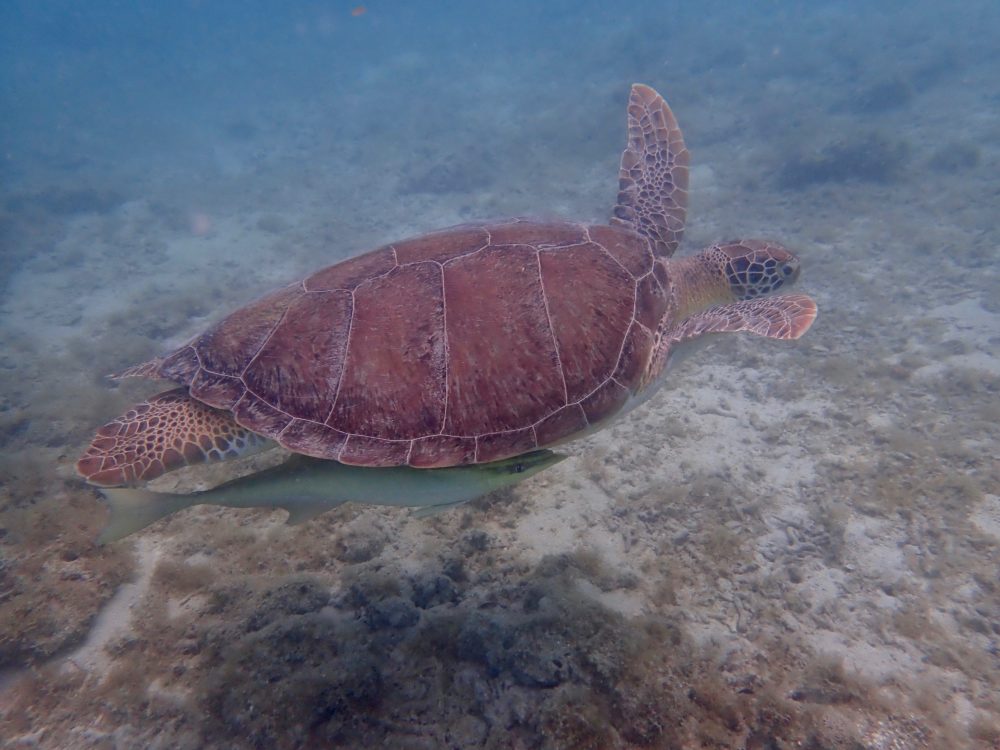
Maho Bay is a pretty anchorage with a long beach. The US Park Service has filled it all with mooring balls – some of which do not pass muster. A ranger on a runabout demanded to know why I was anchoring in the sand when there were a hundred open moorings. I showed him where a failed mooring lay just before my anchor. An old anchor, but one I trust more at times than even federally funded moorings.
We make for Jost Van Dyke next.
Virgin Passage

The Virgin Passage is probably the most traversed body of water around here. And it almost always sucks. A huge river of Atlantic floods the strait between Culebra and St. Thomas twice a day, and fiercely on a new moon exacerbated by Florence as she passes well north of us en route to her inevitable landfall in the Carolinas.
We ended up motoring it, happy that I spent time to clean the prop in Culebra before crossing. We left late this fall and now there is little wind except what a passing squall or larger storm can afford us as they sweep by in mid-September. Isaac churns along to the East and appears to track well south of us as a small storm. Still, we keep an eye to weather and are ready to hole up in Ensenada Honda de Vieques to our south, or reach for Virign Gorda should Isaac curve north toward us.
St. Thomas bore Irma last year before we saw Maria. There are still boats along Water Island, but wrecks too, and many dismasted hulls. Honeymoon Beach still has dinghies running to and fro though. The bay is just as rocky and untenable to anchor as I remember, although we did make a casual acquaintance under our hull…
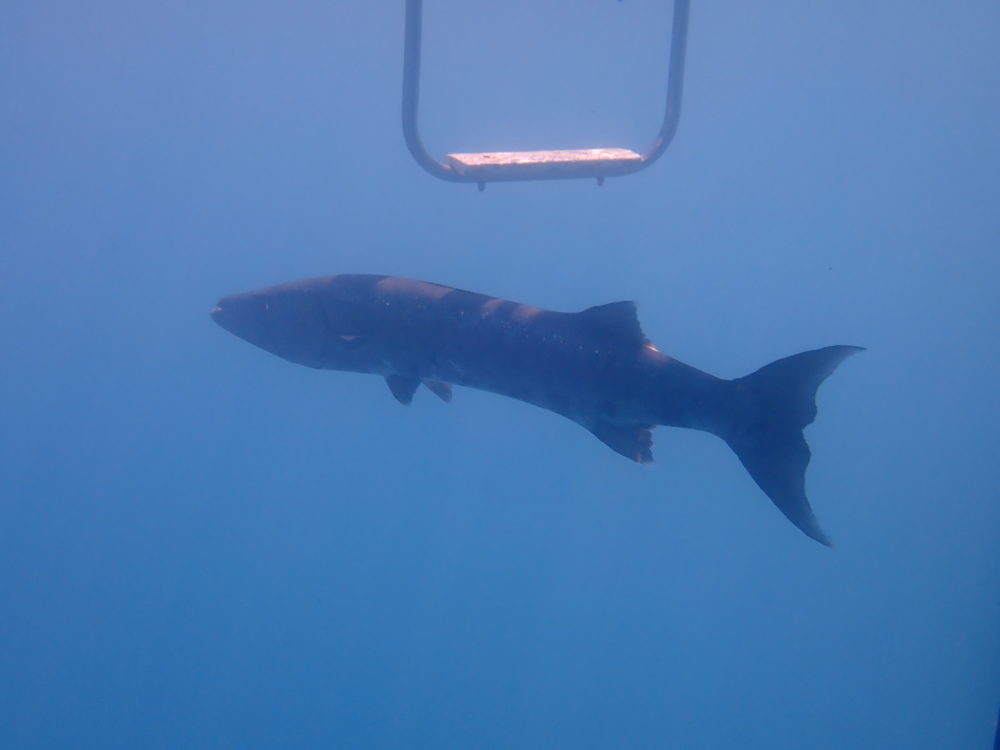
Flamingo Bay to the south is quiet and calm, aside from the surprising amount of motor traffic coming in and out of the pond waking us. But overall it’s peaceful and just somewhat more buggy from being here two years ago.
Max is improving his swimming in this clear water, as well as his patience and calmness, with some punctuated exceptions. He sometimes makes startling breakthroughs for a five year old. He has few distractions from his new environment and it molds him in unexpected and profound ways. His travel reminds me I was not born to this life, and I wonder what potentials he will achieve that are barred from me, if he so desired. Sara instructs him academically in the mornings. We get done whenever we feel ready to be done. This is how school should be. I vaguely remember this from my early childhood as my mother taught me literacy. I feel for her difficulties overcoming my obstinate childhood. So it goes.
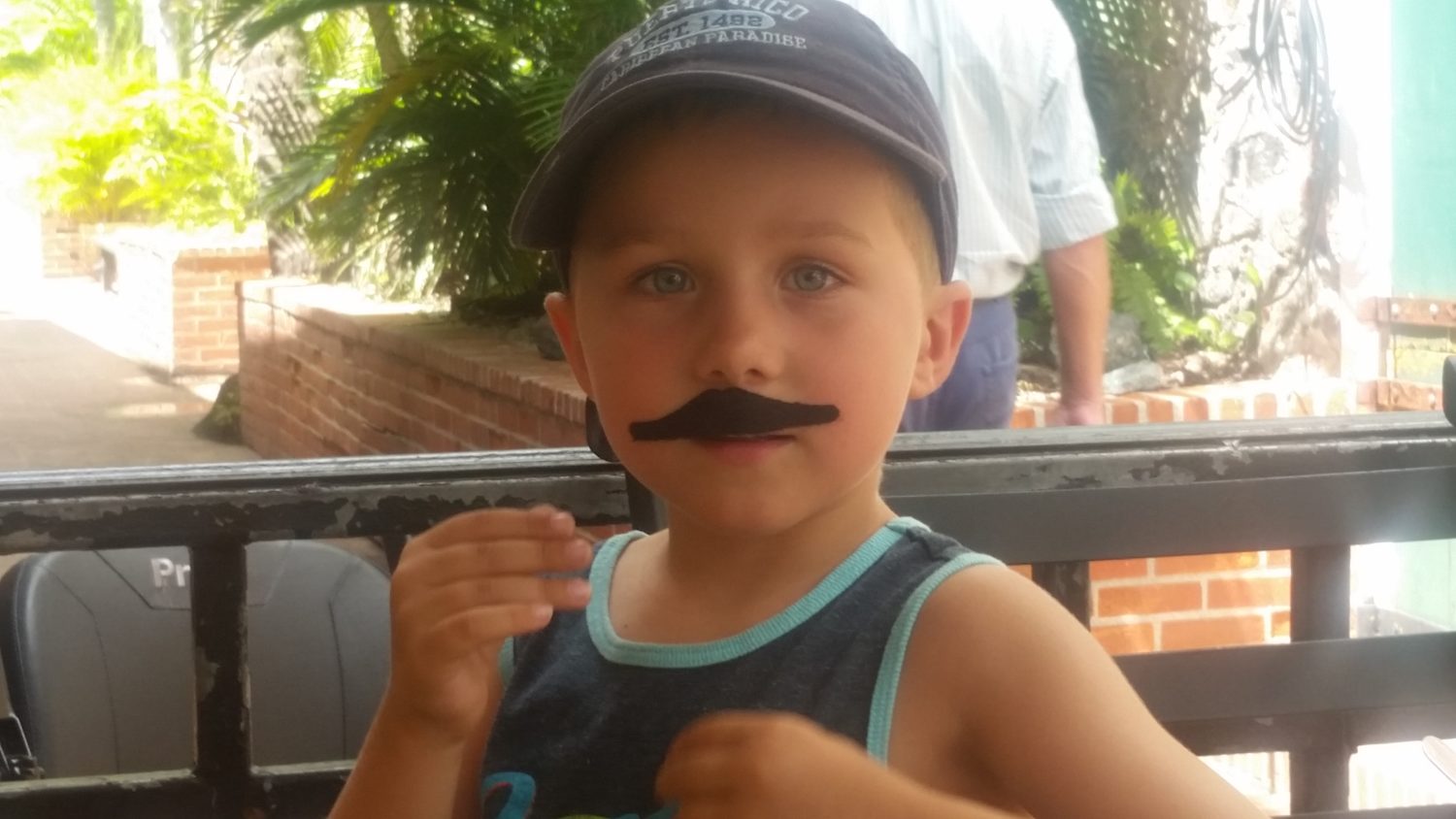
We made for Benner Bay to replace a mizzen shroud and find out who was left. Capt. Alex turned up, working on a Wharram Cat. He’s planning to work the boat out of St. John when they’re done. I gave them a couple hands stepping the mast. The lagoon has changed a bit. Compass Point is stretching their tendrils out farther, adding another dock of wood pilings and pushing the anchorage out tighter. The Triangle is more shoaled. The bars still open, and the yard is much the same. Skip the rigger set me up with my wire, properly sized bronze turnbuckle and a new sta-lok swedge, and aloft I flew pulled up by Sara. The bottom block on our bosun’s tackle is tight and hot at the sheave pin, ready to be replaced and squealing in protest, but whatever. Perhaps that’ll be my epitaph: I’ll deal with it later. We gave Max a go at the bosun’s chair to the Mizzen spreaders with an overall positive reaction from the little man. We promoted him to Bosun’s Mate on the spot. It’s like there’s nothing in the chair when he is up. Eyeballs with fingers, he has the perfect physique for a rigger.
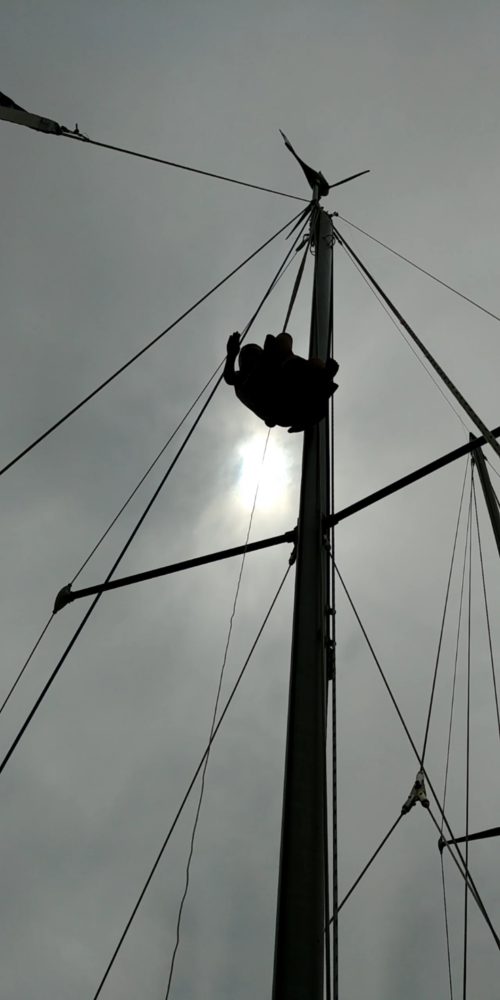
I walked the boatyard with a certain amount of indifference. Last time I hauled here it was pretty miserable, requiring me to practice my EFR technique twice in one day, with the second round of first aid attending a horrific automobile crash, ending with a liberal covering of blood and red paint, mixed and drying with variable degrees of permanence dermatologically and psychologically. This visit was quieter, thankfully. I am not eager to haul out here again though. I still stop at crossings to remember aloud to look to the right, as they drive on the left, albeit with American cars, so the driver can hardly see the middle of the road.
I try where I can to turn a blind eye to the leftover havoc left by Irma as it enrages and amplifies the shrill internal screaming I hear that seems to have my voice in all matters since we were hit by Maria… and ignored for weeks. I know USCG has been busy here as in PR hauling away beached hulls. Things are different though. A year later and I trip over the changes, so evident once outside the cruise-ship compound and busy avenues of Charlotte Amalie. 104.3 “The Buzz” and NPR were the first radio we received in Vieques after Maria, their operators elevated to a certain heroism in their frantic efforts to power their transmitters with generators hauled up Crown Hill. Perhaps listening to them 30 miles away from home over the past year has endeared me a little more to this place. But it’s different from before.
We sip our Carib (or juice for the little swab) and play dominoes and become impatient to get out of the mosquito laden nights in the lagoon, peppered by noseeums that are oblivious to our bug spray. Our stalwart 12V fans can only dissuade their thirst for blood so much. Fortunately Sara and Max are much sweeter meals than me.
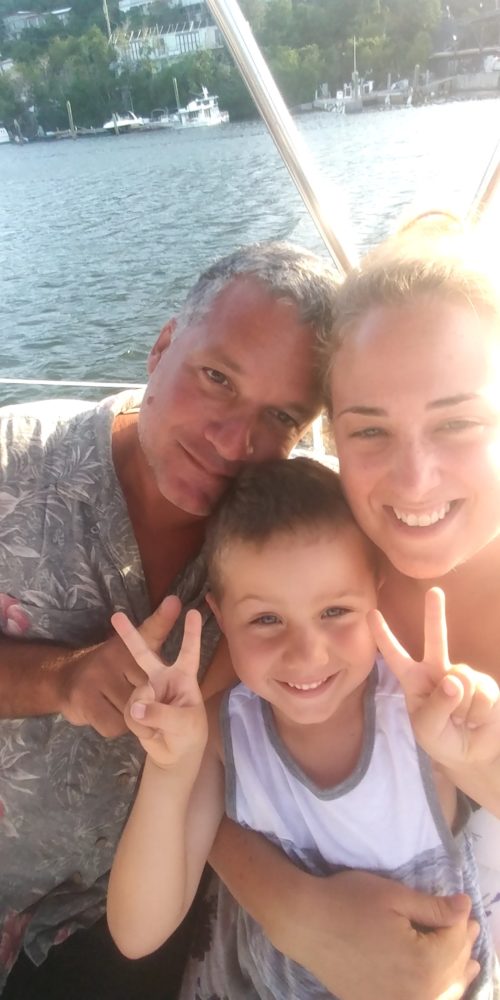
Water, provisions, and we’ll be under way again.
Watching the Weather from Culebra
We made it as far as Culebra. Culebra, per usual, was mostly closed for reasons. They open their businesses when they want to, take the day off when they have better things to do. Must be nice, unless you’re an employee. Dinghy Dock was still open. Imagine, a dock where one can tie one’s dinghy with the reasonable expectation that it won’t be molested by sea or casual vandals. It strains the imagination.
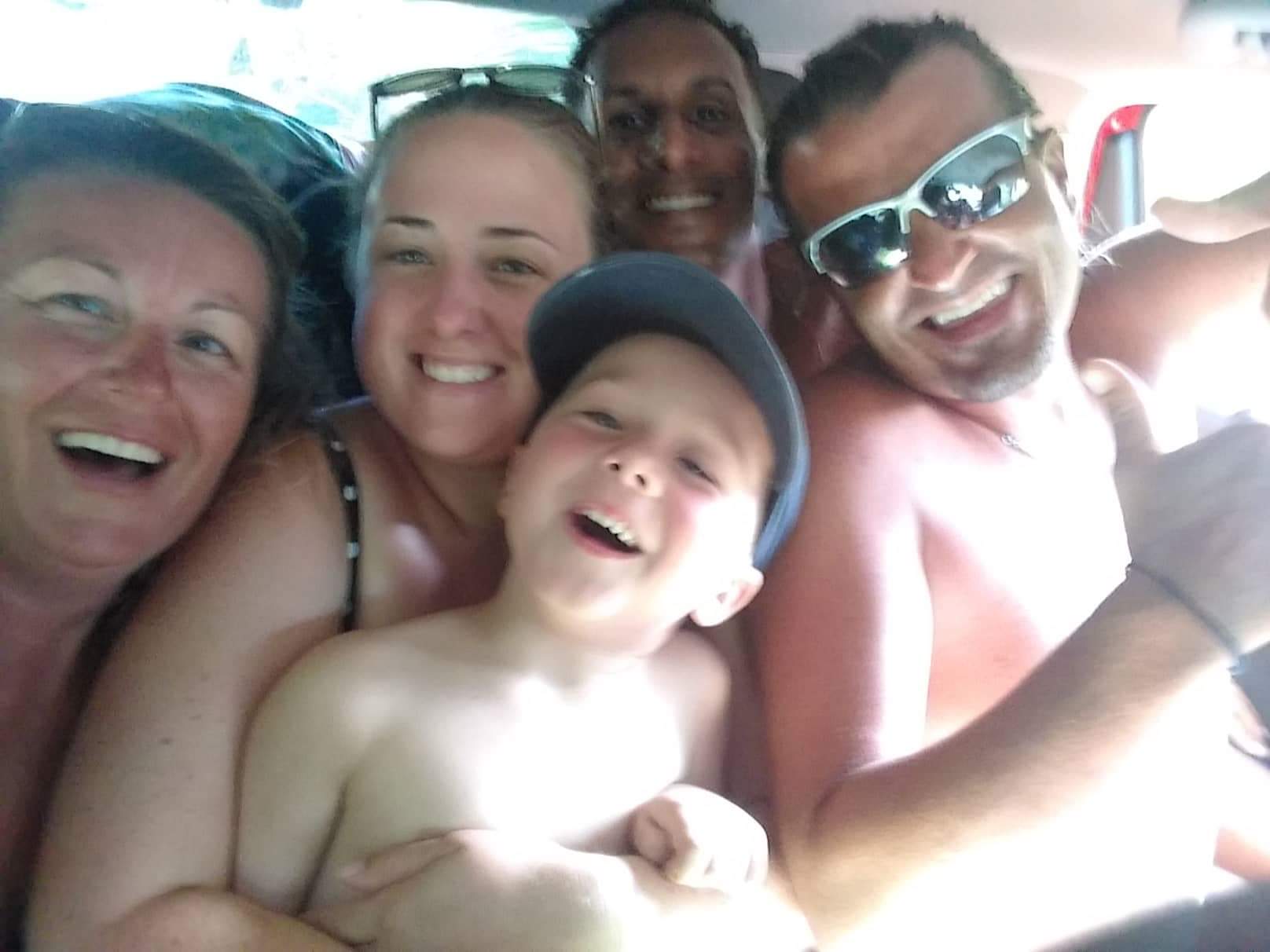
Nate, Edgardo, Stu, and Laura accompanied us across the Sonda de Vieques, enjoyed a fine day on all three of the beaches here, and then they returned via plane and ferry to Vieques. I enjoy sharing a place with friends without needing to be an official tour guide. Culebra is bite-sized and pleasant on the eyes.
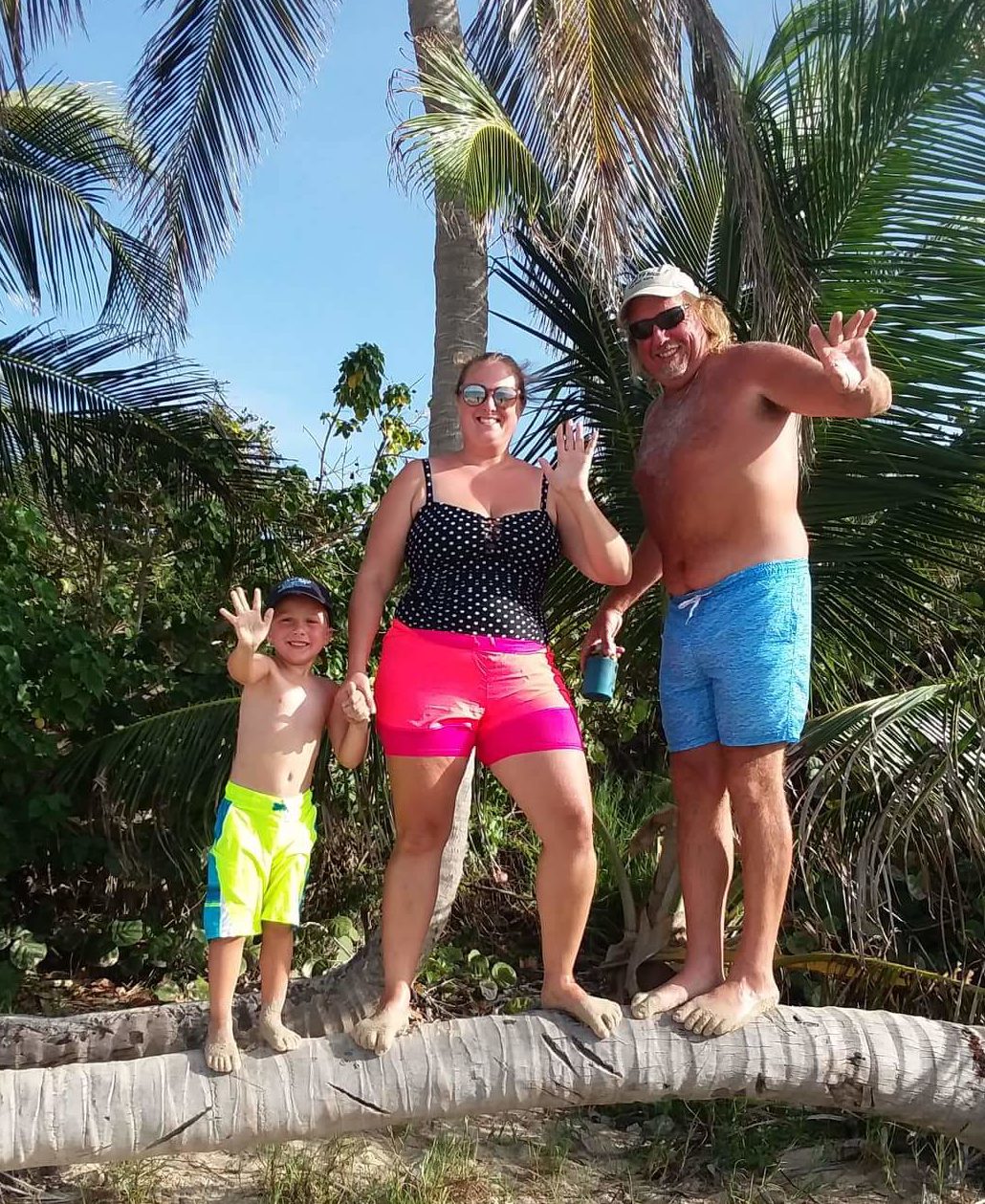
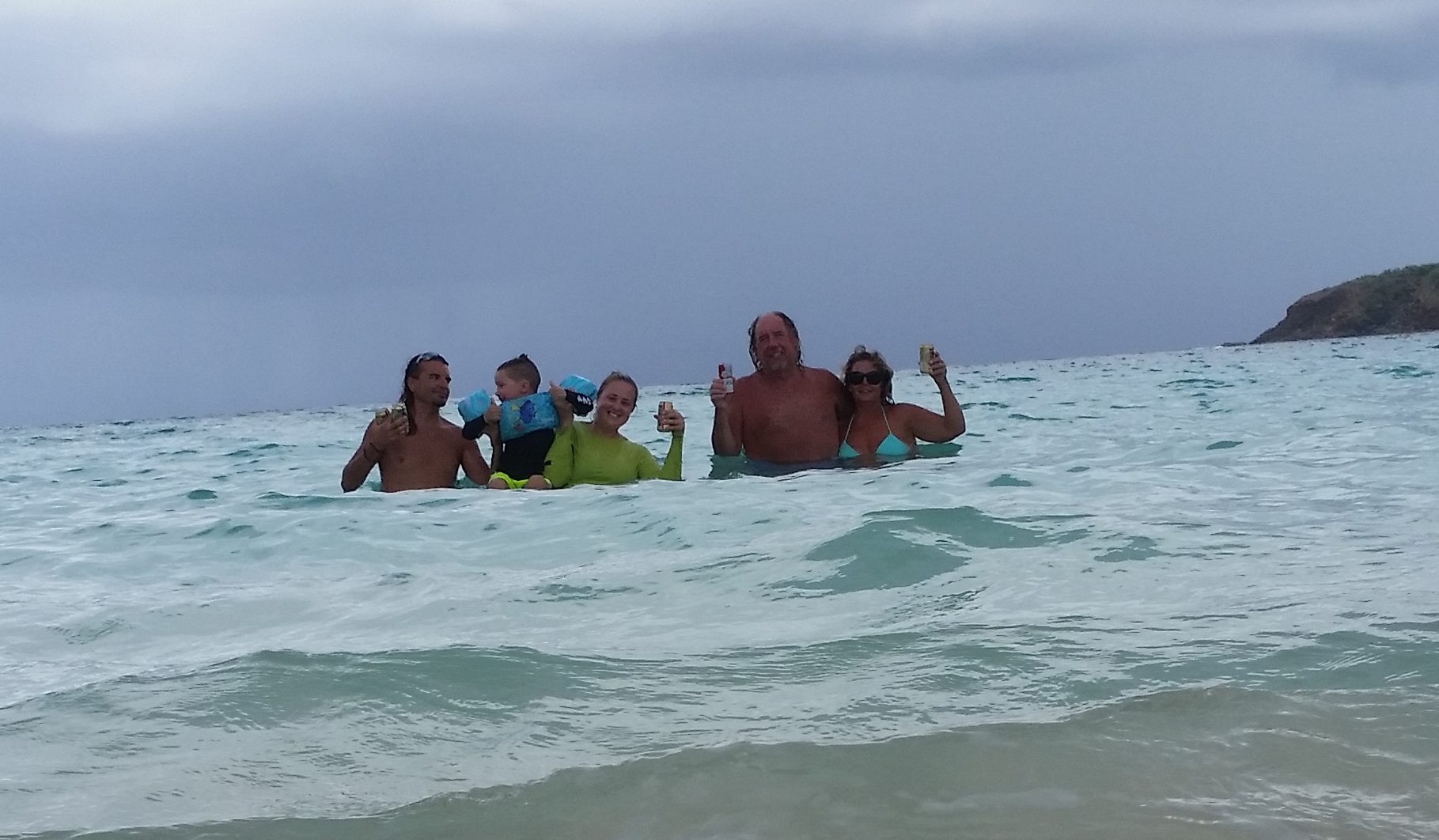
We’re late in the season. Very late. We should be south, south, south. But now it’s September and there are threats from the weather. Isaac now spins and approaches, generating spaghetti probabilities of death and doom in our general direction. It’s hard not to think back to Maria, and losing this whole year in so many ways. The image of stretching tendrils of possible futures on the chart of the Atlantic make it hard to choke down all that fine cuisine coming out of the galley and requires a thorough washdown of bloody red wine and what rum we’ve packed. Such is the lot of voyagers. Soon we’ll need to decide whether to jump ahead, or flee south, or hunker down as the forecasts coalesce toward what we imagine reality to be.
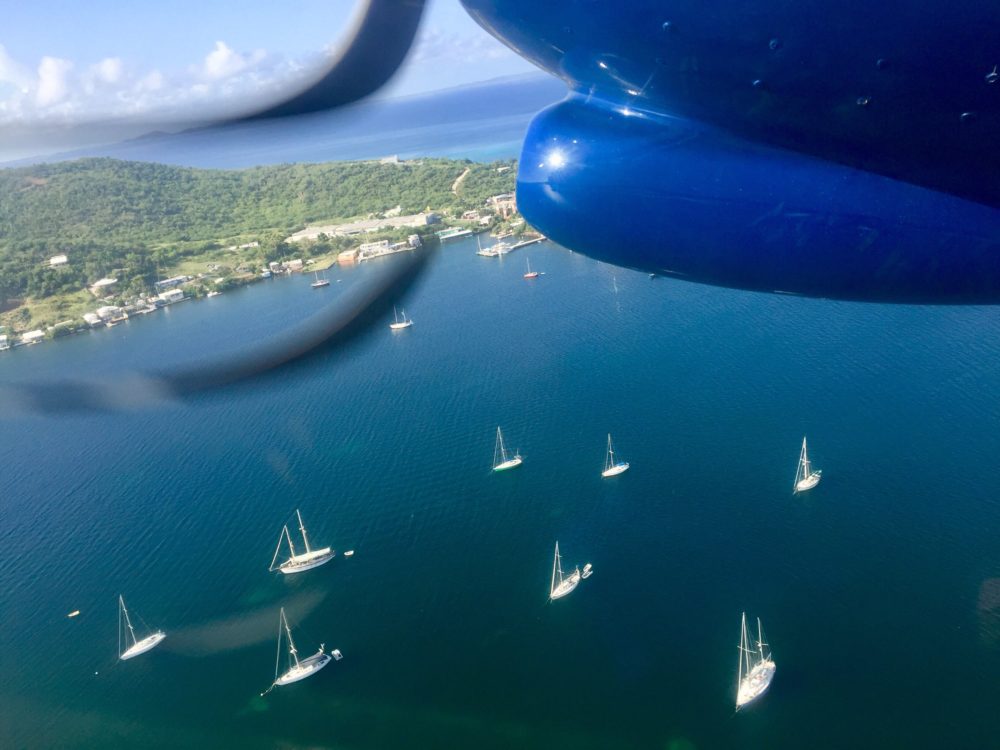
How I wish we had finished the hard dinghy! I’ve only been gluing it together for the past four years. I’ve anointed the exorbitantly overpriced yet under-built blow-up raft with yet another patch on her bow, the hole courtesy of the fuel dock while I was distracted. But my lower back is grateful. A few minutes with glue and sandpaper is a small concession to pay compared to the daily necessities of lugging water, provisions, and fuel across the rubble-strewn sand and launch into the surf back to our mooring at Isabel II.
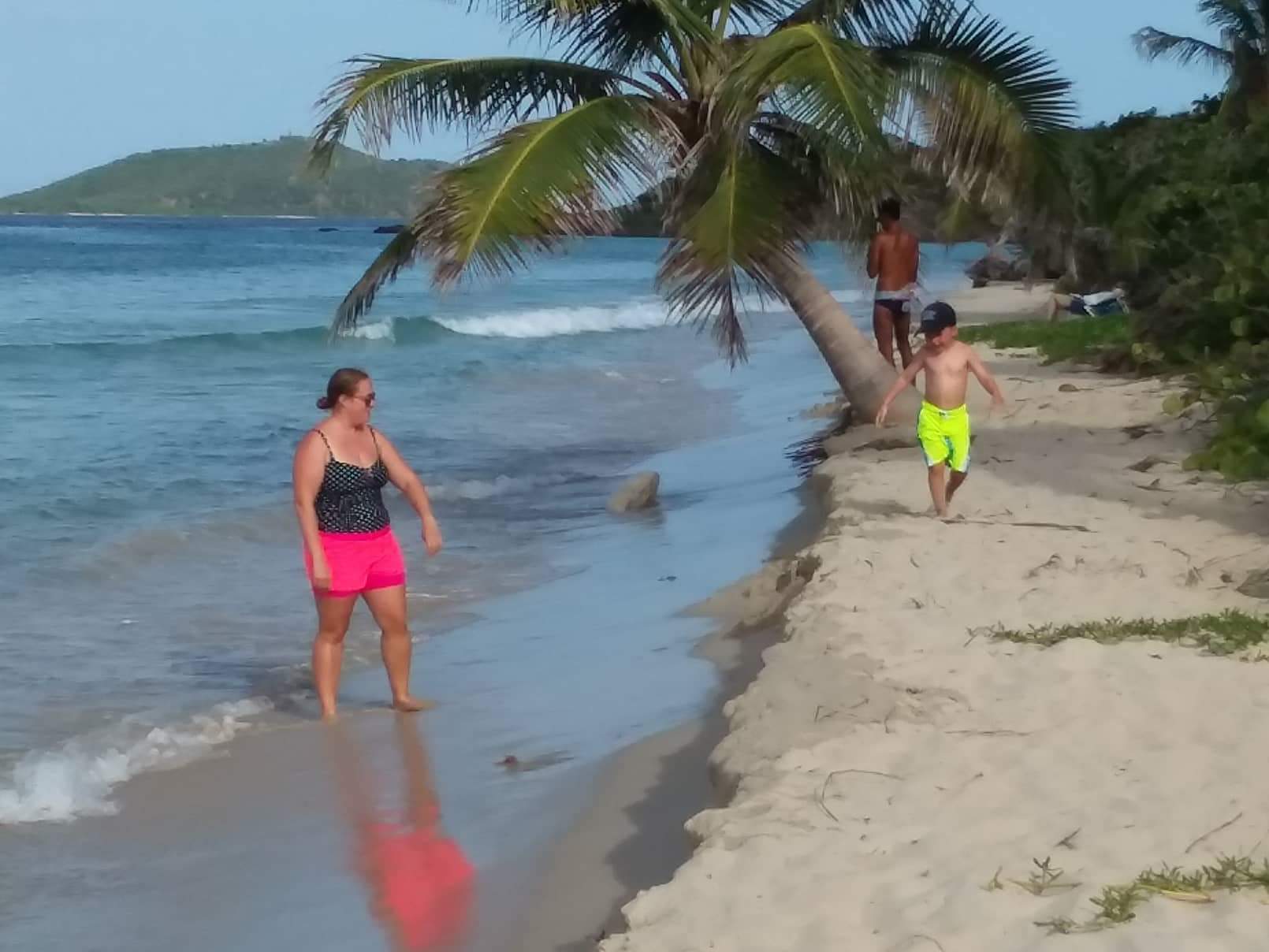
Sara is learning the intricacies of our little outboard motor and dinghy pilotage in the relative calm of Ensenada Honda de Culebra. Max is spending his days in the water or playing video games. It’s warm and sleepy here.
We have a shroud to replace in St. Thomas. It’s not critical yet, but worrisome. We may make the Virgin Passage crossing tomorrow, or Monday.
Morning Commute
As we loaded up the dinghy yesterday, to close up shop in Vieques before cruising, the morning traffic in Bahia Mulas was pretty heavy.
5+ green sea turtles and 4,357+ moon jellies.
The turtles are regulars, but the jellies are seasonal.
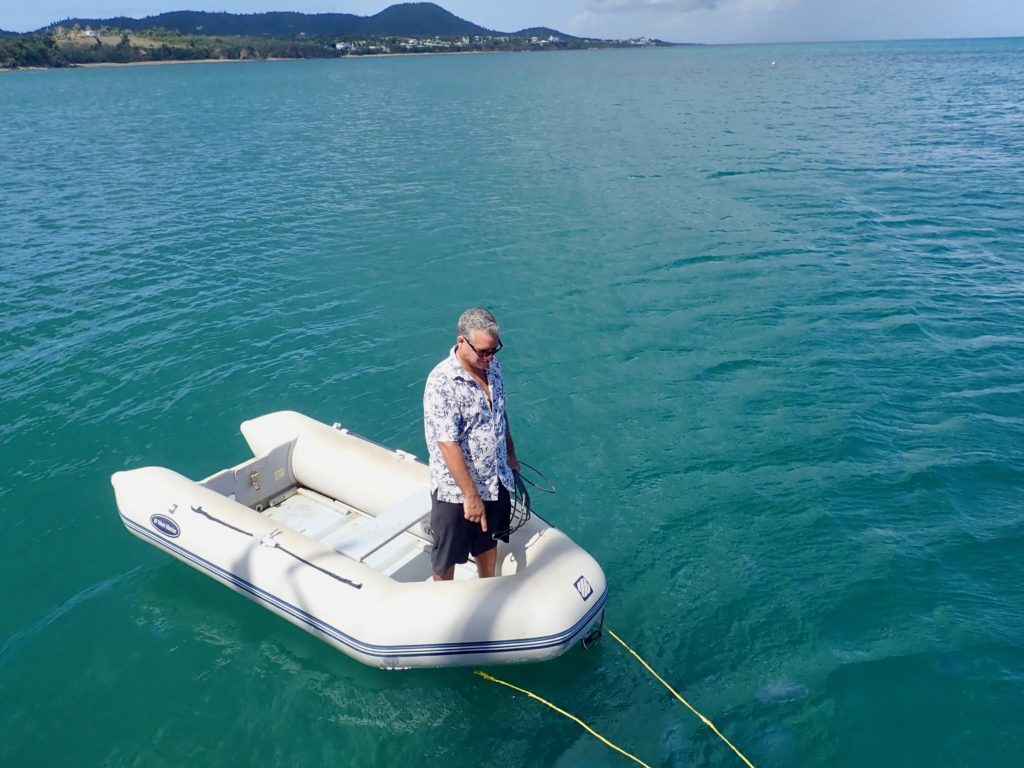
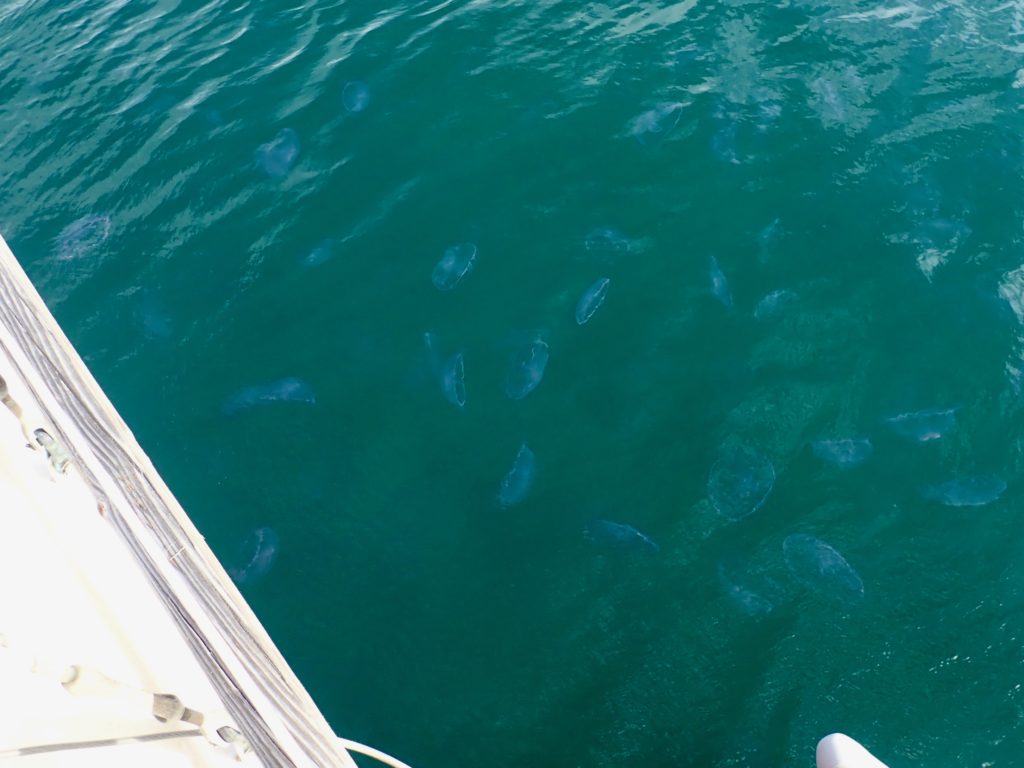
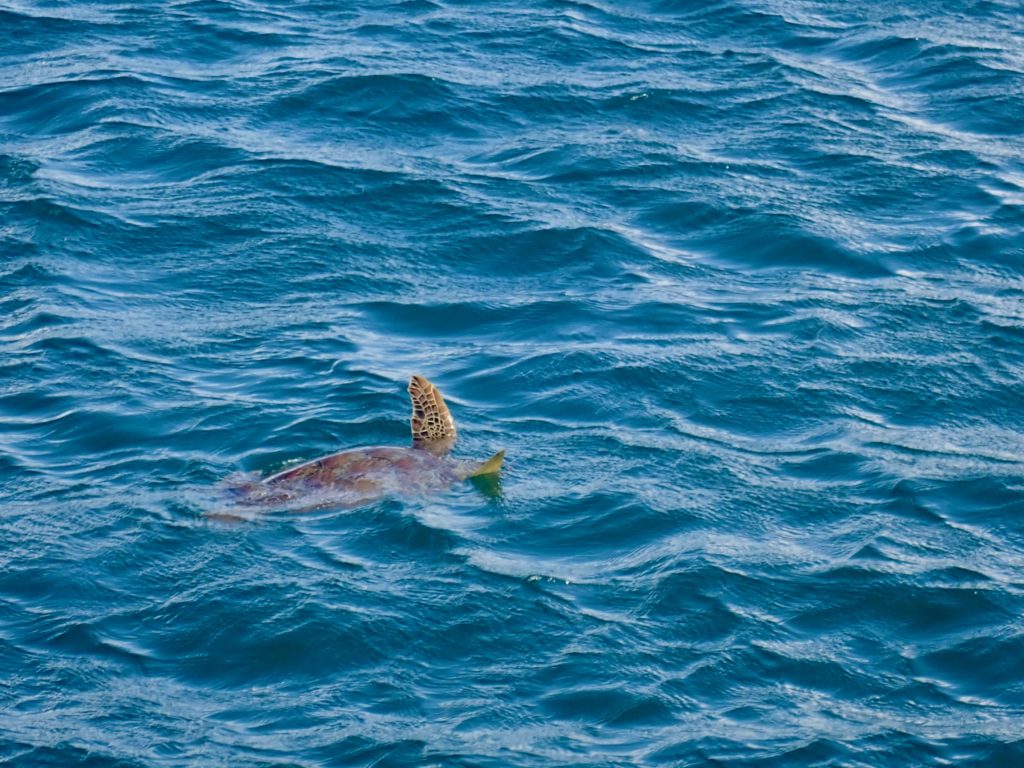
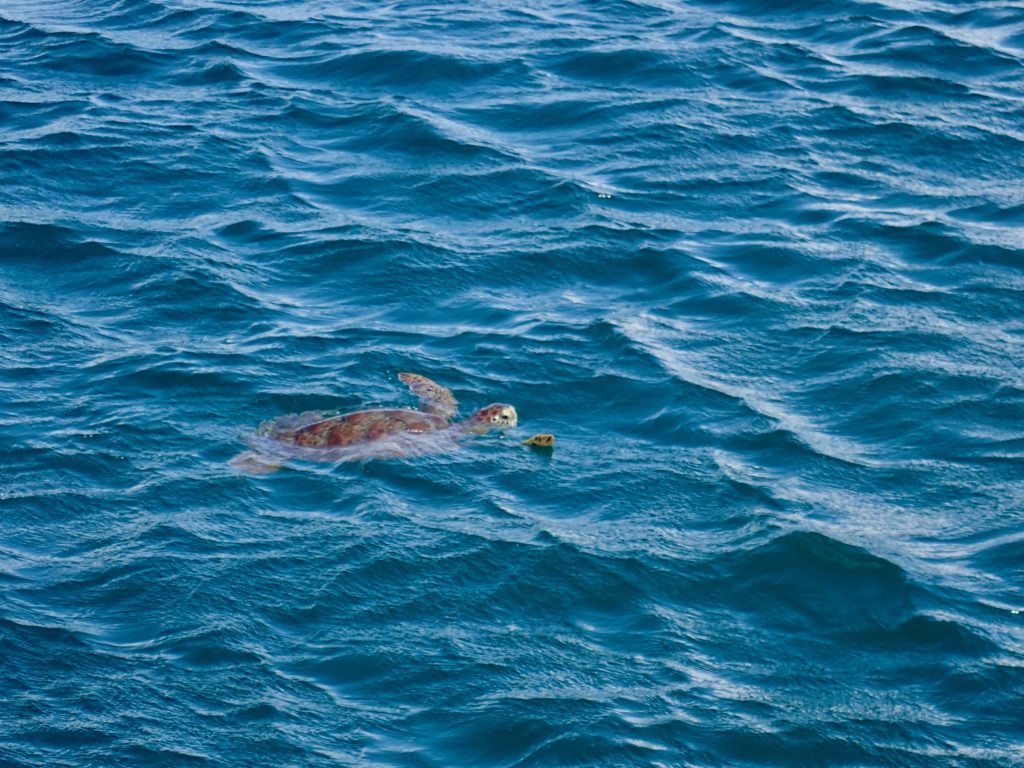
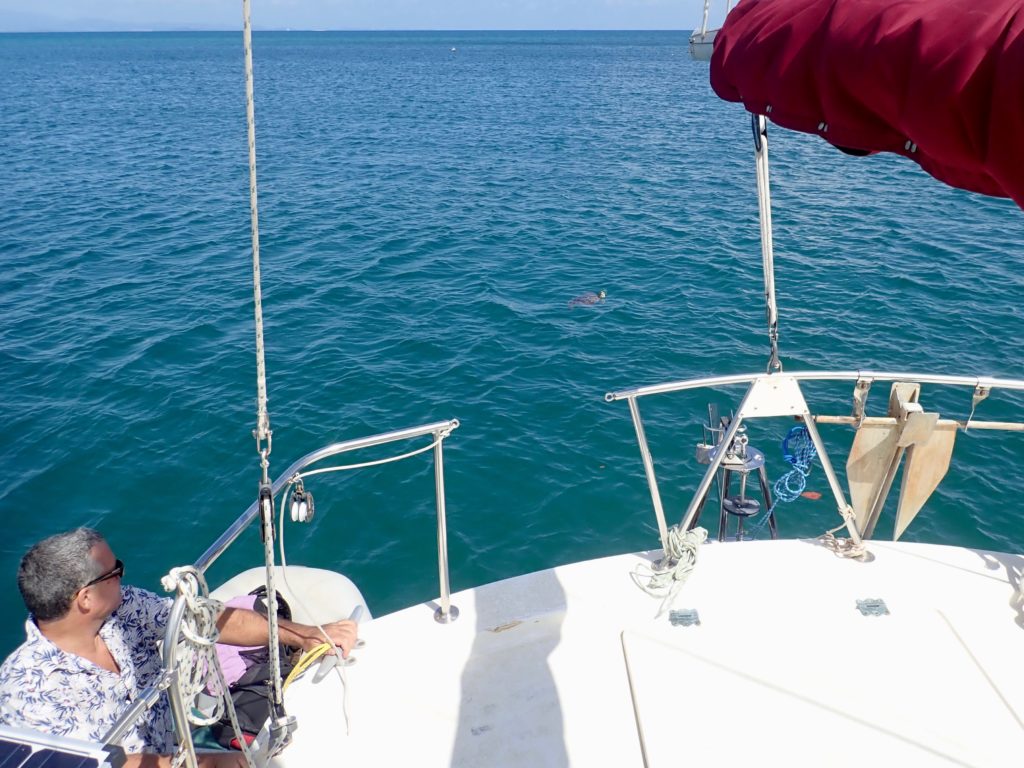
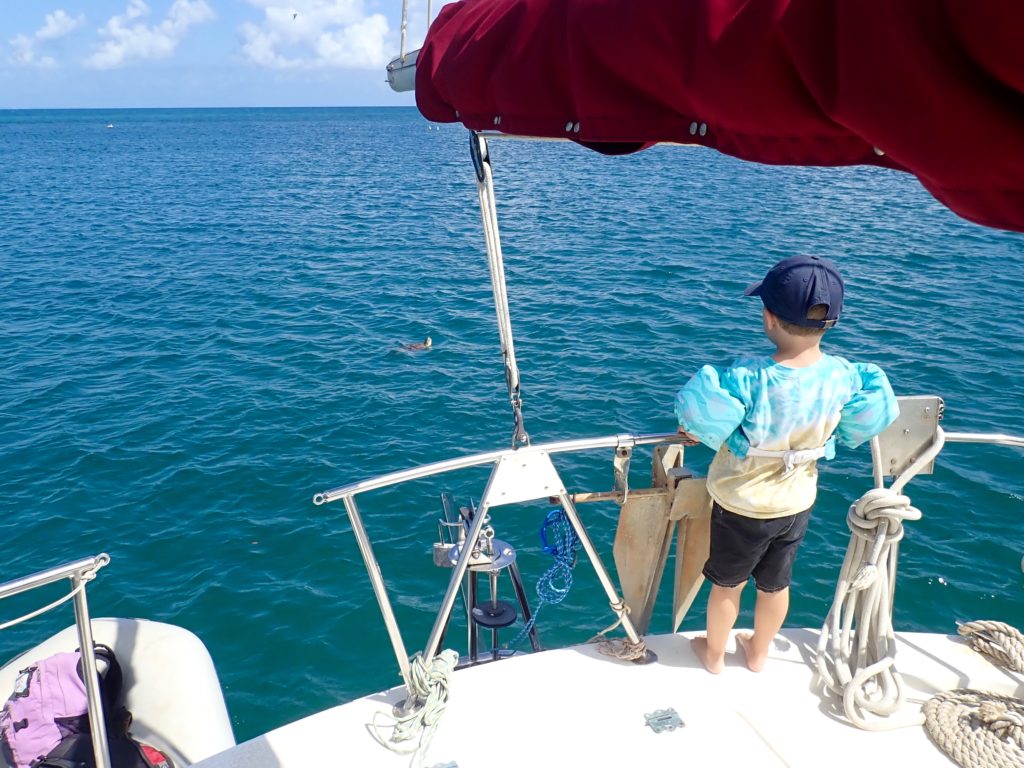
A Cleaner Bilge
Today Sara and I cleaned the bilge. This undesirable task was inadvisably initiated at anchor instead of a dock, where fresh water was to be had.
Removing and disposing of a thin layer of engine oil was no problem. The odor from anarobic bacteria which bred beneath the warm, murky surface was not the worse thing I ever whiffed. But it is in the top 20. The sludge on the bottom was emulsified. Normally the engine tray picks up the oil drip from the seals, but this is old, prehistoric goo. Ford Lehman Super 90 is a glorified tractor engine; it leaked the day it came off the factory floor. We’ll take this up again when there is fresh water and oil disposal available.
Looking to cruise to Culebra on Tuesday with friends as the wind looks like it will veer ESE. Keeping an eye on the tropical Atlantic Hurricane assessment.
